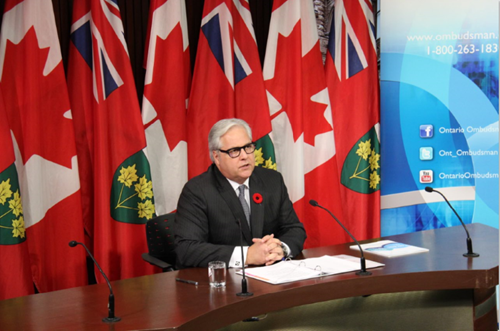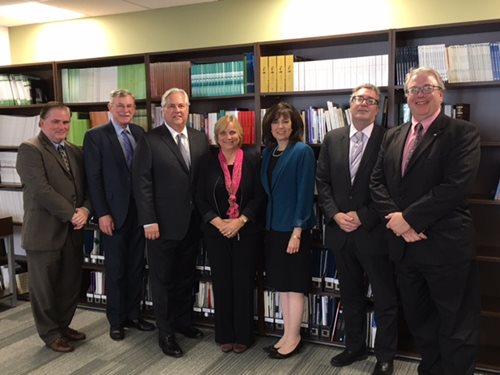Browse Ombudsman Messages
50th anniversary – A golden opportunity for awareness and engagement
(December 22, 2025) It’s hard to believe Ombudsman Ontario’s 50th anniversary year is already drawing to a close. As we look ahead to our second half-century of protecting the rights of all Ontarians, I want to share some recent highlights of this milestone year.
This fall was, fittingly, the climax of our anniversary activities, as we marked our official 50th birthday on October 30, the day the first Ombudsman of Ontario, Arthur Maloney, took his oath of office front of the entire Legislative Assembly in 1975.

The occasion was honoured by the province’s legislative community with statements in the House by all political parties (watch them here), as well recognition from Ontario’s Lieutenant Governor, Speaker, and Chief Justice:
Lieutenant Governor Edith Dumont (October 29):
“There is no question that your Office continues to be a great force for good in Ontario. I offer my sincere and enduring gratitude for everything you do to keep our democracy working and to keep our public services and public sector organizations accountable, accessible, and of course, fair.”
Speaker Donna Skelly (October 29):
“For half a century, the Ontario Ombudsman has provided Ontarians with impartial support, strengthened public accountability and improved government operations. Since its establishment, the Office has become an essential part of the province’s democratic system, thanks to its independence, its neutrality and commitment to protecting citizens’ rights.”
Chief Justice of Ontario Michael Tulloch (October 23):
“The Ombudsman ensures accountability through investigation and persuasion, by identifying unfairness, recommending remedies, and fostering reform… [T]he Ombudsman extends the rule of law beyond the courtroom, ensuring that public power is exercised fairly, transparently, and with restraint.”
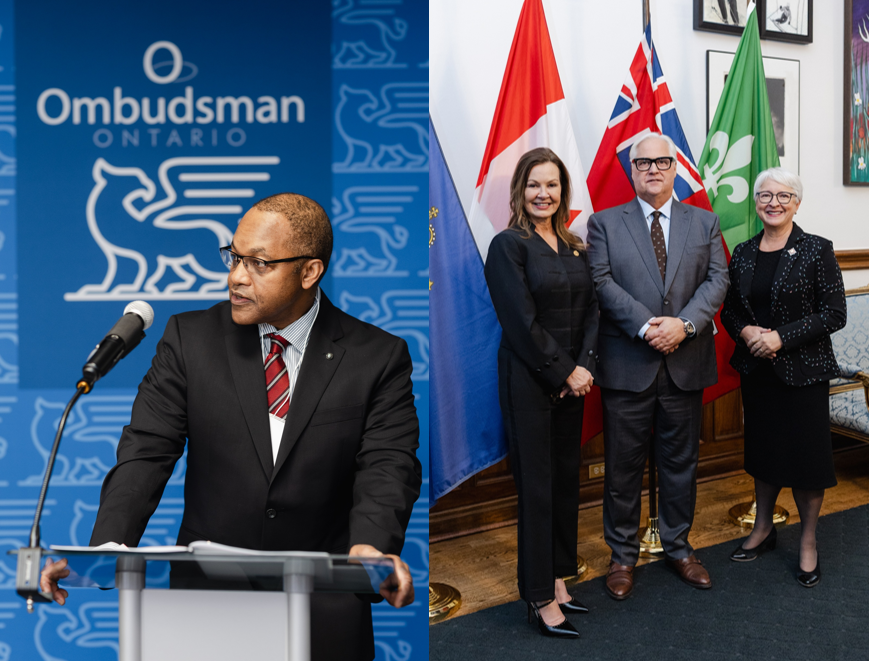
In November, our activities included two major events – each the first of its kind for us:
- “Principles and Practices”— International Ombudsman Symposium (November 12): It was an honour to host this online gathering of some 250 people from ombudsman offices in more than 30 countries across the globe. Two panels, featuring seven Canadian ombuds and the former UK Parliamentary and Health Service Ombudsman, discussed hands-on practical issues as well as broad topics like how we can all rely on the international principles that protect the role of ombudsman offices around the world. Anyone is welcome to watch the full webinar in English here (a French version, with interpretation subsidized in part by the International Ombudsman Institute, is available here).
- 2SLGBTQIA+ Youth Rights Conference (November 28): More than 40 young people from the Greater Toronto Area gathered in person in downtown Toronto at our conference for 2SLGBTQIA+ youth and their allies. This dynamic and engaging event featured compelling speakers and activities (even a scavenger hunt!), all focused on helping young people understand their rights, learn about public services, and hear from local organizations where they can get help. We also shared information about how Ombudsman Ontario can help them directly.
As we head into a new calendar year, we’ll build on these successful events and continue to raise awareness of our 50-year track record as an essential democratic institution.
In my view, the most impactful highlight of this year was the launch of our new Good Governance Awards to recognize exemplary administrative conduct by provincial government and public sector organizations.
The reaction of the recipients of these awards has underlined the importance of working collaboratively and giving credit where it’s due:
Ontario Provincial Police (February):
“We are grateful to Ombudsman Ontario for recognizing our continued improvement in our French-language capability, aimed at engaging and leveraging partnerships with Francophone communities."
– OPP Commissioner Thomas Carrique
City of Hamilton (August):
“It’s an honour to be the first municipality recognized by the Ombudsman for our efforts in the interests of transparency and accountability. We appreciate his office’s expertise and guidance in this area.”
– Mayor Andrea Horwath
Ministry of Transportation (October):
“This recognition from the Ombudsman is greatly appreciated, particularly by those who deliver frontline driver testing services to millions of Ontarians. The pandemic backlog of road tests was unprecedented, but the strategies that effectively eliminated it are ones that this ministry and others can apply again and again.”
– Deputy Minister Doug Jones
You can read more about the criteria for these awards and the recipients’ achievements here.
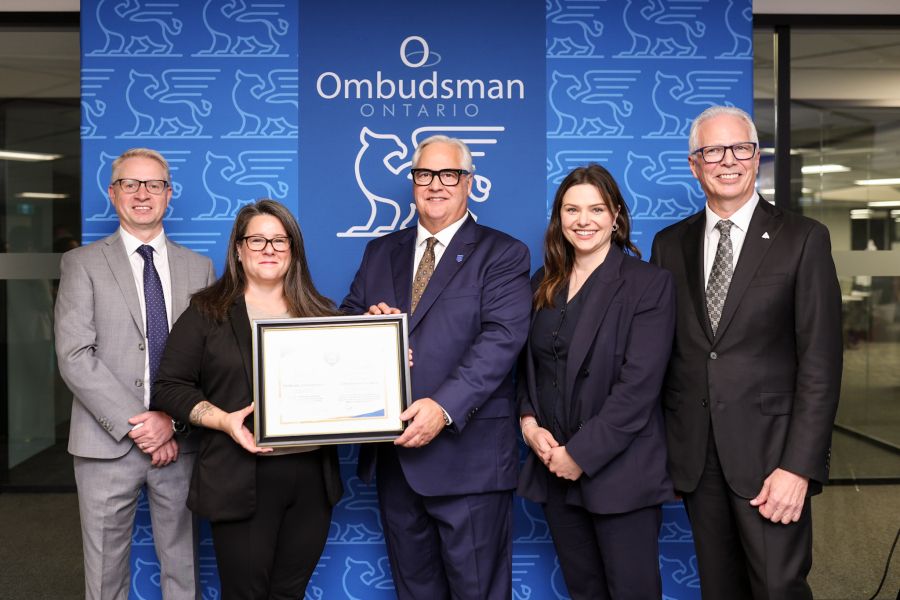
We also refreshed our logo for this milestone year by bringing back and modernizing the Ombudsman’s original 1975 insignia, the gryphon – chosen to represent the office’s role as a protector of rights and the rule of law. The gryphon will continue to spread its wings on our products and stand guard for all Ontarians’ rights as we head into our 51st year.
Of course, as history marches on, there are always new milestones – for instance, we are now marking a full decade of oversight of school boards (as of September 1, 2025), and of municipalities and universities (as of January 1, 2026).
I look forward to speaking to two key groups in these areas in January – the Rural Ontario Municipal Association (ROMA), and the Ontario Public School Boards' Association.
To all the members of the public, fellow ombudsmen, oversight officers and officers of the legislature, MPPs and other elected officials, public servants and community leaders who took the time to participate in our events this year or engage with us through our brand-new website or other means – thank you. Our interactions with you are a daily reminder that our work is all about collaboration, relationships and working towards the common purpose of good governance for all.
I also want to thank everyone on the Ombudsman Ontario team for their consistent, dedicated commitment to our mission, vision and values. They are the people who built this organization’s 50-year track record and legacy, and who continue to make a positive difference in the lives of Ontarians every day. On December 3, it was my privilege to recognize more than 70 staff members for their long service to Ombudsman Ontario – including those with 20, 35 and even 40 years of service. I am honoured to work alongside people who care so deeply about the meaningful work we do.
From all of us, best wishes for a restful end to 2025 and a bright start to 2026.
National Day for Truth and Reconciliation
(September 30, 2025) On September 30, we recognize the National Day for Truth and Reconciliation alongside Orange Shirt Day, an Indigenous-led grassroots commemorative day.
The National Day for Truth and Reconciliation provides an opportunity to reflect on the tragic legacy of the Indian Residential School System and honour the survivors and the children who never returned home, as well as their families and communities. This day also serves as a time to learn and raise awareness. Wearing an orange shirt shows a unified step towards reconciliation and building stronger relationships. The orange shirt symbolizes the stripping away of culture and forced assimilation of Indigenous children through the Residential School System. This is an opportunity to take the time to listen, learn about Canada’s colonial history, and find ways to celebrate Indigenous cultures.
Ombudsman Ontario has aligned one of the ways we give meaning to this day and Call to Action #57 from the Final Report of the Truth and Reconciliation Commission (educating public servants on the history of Indigenous peoples) with Indigenous-led learning opportunities for our staff. These help deepen understanding and strengthen the ability to create safe, respectful and inclusive services for First Nations, Inuit, and Métis people who contact us for help. However we choose to reflect and learn, we all have a duty to continue forging the path towards reconciliation.
I am proud of the progress our Office is making towards creating meaningful and respectful relationships with Indigenous people, communities and organizations in Ontario. We connect with hundreds of Indigenous people through our outreach efforts and visits with communities. We are also co-developing an Indigenous Service Plan in partnership with Tawi:ne Consulting. Engagement sessions to support its co-development started over the summer and will continue throughout autumn.
Recently, we were invited to visit Neskantaga First Nation to witness firsthand the hardships the community faces, including unsafe infrastructure, inadequate health services and the longest boil-water advisory in Canadian history. We were grateful for this opportunity to listen directly to residents, hear their stories, and understand the desperate hardships of their everyday life. We emphasized that addressing the community’s long-standing issues is not only a moral and legal obligation, but also an opportunity for governments to demonstrate genuine reconciliation through meaningful, lasting change. We are committed to engaging with the federal and provincial governments to share our observations and concerns and learn about their plans to address these vital issues.
Raising awareness of our services, shining a light on the challenges faced by many remote Indigenous communities and giving voice to concerns and calls for respect and recognition of their rights is how we work to contribute to reconciliation. To reinforce our commitment to truth and reconciliation and to provide employees an opportunity to reflect on the history of residential schools, our Office will be closed on September 30 to observe the day of commemoration and reflection.
Deploring unacceptable conditions in Neskantaga First Nation
(September 19, 2025) This week, along with the Director of our Children and Youth Unit, I was invited by Chief Gary Quisess to the community of Neskantaga First Nation, an Ojibwe community located on Attiwapiskat Lake in Northern Ontario, close to 500 kilometres north of Thunder Bay.
The visit was spurred by a public call for media and political leaders to travel to Neskantaga First Nation to witness firsthand the hardships the community faces, including unsafe infrastructure, inadequate health services, and a 30-year boil order – the longest boil-water advisory in Canadian history.
The people of Neskantaga First Nation were generous in welcoming us, all while demonstrating their resiliency in the face of such hardships. They have deep ties to the land and roots in this region, their traditional territory. They opened the community, their homes, and their hearts to us to share the pain and frustration in their lives. And they certainly opened our eyes. It is shocking that in 2025, after decades of promises from federal and provincial governments, Neskantaga First Nation continues to suffer under unacceptable conditions, including boil-water advisories, a lack of education and inadequate access to health care.
Visiting with community members and hearing their stories

Photo provided by Neskantaga First Nation.
During the two days, we visited homes, the water treatment plant, the nursing station, the arena, the airport, and other critical infrastructure – much of which is in disrepair or is simply not functional.
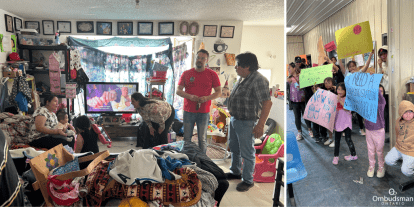
Photo taken by Ombudsman Ontario.
The people I met shared deeply moving stories of desperate hardship. Because of insufficient housing, families crowd into houses with basements with dangerous black mold. Children are growing up never having known safe tap water; bottled water rations of 1.5 litres per day for adults and 1 litre for children are not enough, and the waste of plastic bottles fills homes and landfills. The nursing station has been out of commission since a flood earlier this year. Nursing care is provided in a duplex, which cannot accommodate health professionals or modern telehealth technology.
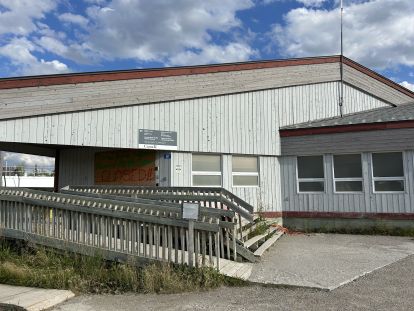
Photo provided by Neskantaga First Nation.

Photo taken by Ombudsman Ontario.
We visited a local graveyard, with graves of children surrounded by stuffed animals and flowers. Many of these lives were tragically lost to suicide. Other young people were sent out of the community to attend high school because the community does not have one for their citizens – only to return home in caskets. This is a heartbreaking reality for Neskantaga First Nation.
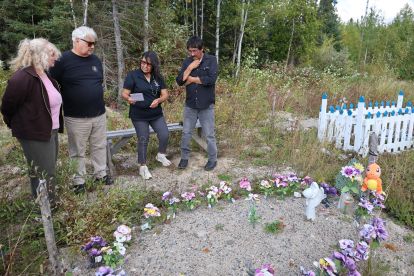
Photo provided by Neskantaga First Nation.
Unsafe and unusable infrastructure
The effects of the “poorly planned and underfunded” relocation of the community from Lansdowne House in the late 1980s reverberate today. As noted in a public statement by Chief Quisess:
- The arena is an empty shell without ice or programming, because of a lack of funding and Hydro One’s outdated diesel system.
- The proposed Cultural and Youth Centre, identified in 2013 as a priority, has yet to be built.
- The school has not been upgraded in 30 years, and students as young as 13 must leave their families to pursue education in distant urban centres, too often with tragic results.
- The health care system is in crisis, with the original nursing station boarded up and the temporary replacement centre unable to accommodate modern technology or the staff it needs.
- A new Nishnawbe-Aski Police Service station cannot open because no telecommunications carrier will provide service.
- The airport cannot host larger fuel containers, forcing reliance on costly short-haul flights that lengthen travel and burden those with medical needs.
A commitment to reconciliation
This visit was an important opportunity to listen directly to residents, hear their stories, and observe the realities they are living with. As part of Ombudsman Ontario’s Indigenous Services Plan, we are committed to raising awareness of our services, shining a light on the challenges faced by many remote First Nations and to contributing, in our role, to reconciliation by giving voice to concerns and calls for respect and recognition of their rights.
No community in a country as prosperous as Canada should have to endure what Neskantaga First Nation is facing. Living without essential services like health care, safe water, mental health resources, and education is simply not acceptable. The people of Neskantaga First Nation deserve equity and dignity, and they have the right to be safe and healthy.
I urge the federal and provincial governments to act now to resolve the long-standing challenges in Neskantaga First Nation. Governments committed to the reduction of red tape would do well to prioritize eliminating the red tape that deprives remote Indigenous communities of safe drinking water and adequate funding for health care, education, and infrastructure. We are committed to engaging with the federal and provincial governments to share our observations and concerns and learn about their plans to address these vital issues. This is not only a legal and moral obligation, it is an opportunity for Ontario and Canada to demonstrate genuine reconciliation through meaningful, lasting change.

Photo provided by Neskantaga First Nation.
A strong voice for fairness – now more than ever
(June 25, 2025) It is my great pleasure to present my 10th Annual Report as we mark Ombudsman Ontario’s 50th anniversary. It has been an historic year in many respects.
As we mark a half-century of protecting Ontarians’ rights and promoting fair, accountable public services, our role as an independent oversight body has never been more crucial.
Ontarians are turning to us in record numbers and benefiting from our unique ability to navigate bureaucracy, resolve problems in accessing public services, protect their fundamental rights, recommend systemic reforms and drive improvements in public administration.
In fiscal 2024-2025, we received 30,675 complaints and inquiries from people seeking our assistance. This represents a 30-year high, based on statistics we have reported every year since 1975-1976. Over that time, our intake processes evolved, our use of technology improved, and our jurisdiction expanded significantly. Given all of that, I can confidently report that in this milestone year, we have helped more Ontarians with more issues than at any other time in our history.
Correctional services – the urgent need for reform
The complaints brought to our Office often reflect deep public frustration with delays and failures in government services – even in cases where responsibilities and timelines are clearly defined. Our role is to ensure that public administration remains responsive, fair and accountable – principles we uphold across all areas of our mandate.
But many of the issues we confront go far deeper than poor service. They raise serious questions about basic human rights.
Nowhere is this more apparent than in Ontario’s correctional system, which is, frankly, in growing crisis. We received 6,870 cases about correctional facilities this past year – a staggering 55% increase over 2023-2024. While this sector has long been our top source of complaints, the nature and severity of what we are hearing – and witnessing firsthand during our visits – demand urgent attention.
Most people held in Ontario’s jails are not serving sentences; they are awaiting trial, legally presumed innocent. Many institutions are dangerously overcrowded – some operating at over 150% of their intended capacity – and/or facing chronic staff shortages. The result is a deteriorating environment marked by escalating tensions and compromised safety for inmates and staff alike.
Respecting the rights of individuals in custody is a legal and moral imperative, and my team and I are intensifying our efforts to this end. Correctional institutions reflect the values of the society that maintains them. When we fail to uphold the basic dignity of people in custody, we do more than inflict harm – we erode public trust, degrade working conditions for staff, and weaken the very foundations of our justice system.
That is why we recently launched an investigation into the province’s response to the two-day incident at Maplehurst Correctional Complex in which inmates were forced to strip to their underwear and sit facing a wall with their wrists zip-tied. When an incident occurs in an Ontario correctional facility that impacts the administration of justice and the rights of inmates, it is imperative that we understand why it happened and what measures are being taken to ensure it does not happen again.
Recent media coverage has exposed just how far-reaching these failures can be. Violations of inmate rights’ are not just internal matters – they are undermining the administration of justice itself. Courts have reduced sentences and granted early parole due to unlawful treatment behind bars. Some inmates have applied to have their charges – even murder charges – stayed.
This is not just a legal and policy failure, it is a moral one. If left unaddressed, the consequences will continue to reverberate through our courts, our communities and our collective conscience.
Ontario’s correctional system is in urgent need of meaningful, systemic reform – not only to relieve pressure on overcrowded facilities and burned-out staff, but to realign the system with its rehabilitative purpose. This is a matter of public safety, human rights, and basic decency. We cannot afford to ignore it any longer.
Promoting good governance
Governments everywhere are grappling with financial pressures as they serve growing and diverse populations. Ontario is no exception. Ombudsman Ontario plays a key role in guiding public institutions toward solutions that are efficient, fair, and grounded in a respect for rights.
At its core, good governance is about giving people a voice and respecting their rights. Individuals must be able to access public services without unnecessary barriers, and their concerns should be heard and addressed meaningfully. We work continuously with public officials to reinforce the link between sound administration, democratic values, and the protection of rights.
Fortunately, Ontario benefits from thousands of dedicated public servants – across the provincial government, within its 444 municipalities, and throughout the many agencies in the broader public sector – who understand and value the importance of independent oversight.
In recognition of this, and building on principles established by this Office from the outset, I launched the Ombudsman’s Award for Good Governance this year, to reflect tangible actions by public sector bodies that have resulted in exemplary administration. I was pleased to present the first Good Governance Award to the Ontario Provincial Police for its efforts to enhance its provision of French language services. We plan to honour other bodies in the provincial government and municipal sector in the coming months.
Building together for the future
This year also marks the first milestone in the three-year Strategic Plan we unveiled last year. I am proud to report significant progress on our key objectives, including a major website redesign, enhanced outreach efforts and increased collaboration across our team (see more on page 11).
In particular, I am proud to highlight the co-development of our first Indigenous Services Plan, which reflects our dedication to meaningful engagement with Indigenous peoples and communities, and to listening, learning, and acting in the spirit of reconciliation. The plan (detailed further in the next section of this report) will be developed collaboratively with Indigenous partners and will be a foundational step in ensuring that our services are more culturally responsive, respectful, and accessible. It marks not just a policy achievement, but a long-term commitment to building trust and advancing reconciliation through our daily work.
In times of economic and social strain, the need for reliable and transparent public services becomes even more critical. This was undeniably evident during the COVID-19 pandemic. Today, as Ontario faces economic uncertainty due to newly imposed tariffs by the United States, it is more vital than ever that government actions designed to protect people, industries and jobs are executed with fairness, transparency and unwavering respect for individual rights.
When the Ombudsman’s Office was first proposed in 1975, Ontario’s government pledged it would “ensure the protection of our citizens against arbitrary judgment or practices.” Over the past five decades, we have remained a steadfast advocate for transparency, fairness, and accountability, working alongside democratic institutions across Canada and around the globe. Our mission aligns with the United Nations’ 2024 Resolution recognizing the vital role that ombudsman institutions play in promoting and protecting human rights, good governance, and the rule of law.
We are stronger when we stand united, ensuring that fairness, accountability, and the protection of rights continue to be the cornerstones of our public institutions.
As your Ombudsman, I want every Ontarian to know that we are here for you, as we have been for 50 years. We are here to listen, to provide oversight, and promote good governance that upholds the values of justice and fairness that define us all.
Protecting your rights for 50 years
(March 27, 2025) – It was 50 years ago, in March 1975, when Ontarians first learned they would soon have an Ombudsman to protect their right to fair treatment by public bodies.
On March 11, 1975, in a Speech from the Throne read by Lieutenant Governor Pauline McGibbon, the government promised to establish a “provincial ombudsman… to ensure the protection of our citizens against arbitrary judgment or practices.”
That promise was kept within a few months, as the Ombudsman Act became law and Arthur Maloney became the first Ombudsman.
Since then, our Office has handled more than 1 million individual cases, conducted hundreds of investigations, and made more than 1,300 recommendations to improve public services for Ontarians.
Our oversight responsibilities have been expanded time and time again, and now extend to all provincial government bodies, municipalities, universities and school boards, as well as child protection services and French language services.
The implementation of Ombudsman recommendations to improve public services has benefited millions of Ontarians. Among those benefits:
- Expanded screening of newborn babies for metabolic diseases
- A more secure lottery system
- A more transparent property assessment system
- More transparency and accountability in municipal and school board governance
- Expanded coverage of certain drugs
- Administrative improvements at tribunals
- Better pandemic preparedness in long-term care homes
- Better notifications of driver licence suspensions
- Broader civilian oversight of police
For fifty years, Ontarians have been able to count on their Ombudsman institution for help navigating government services, and they rely on us to make sure they’ve been treated fairly.
The gryphon, then and now
From its earliest days in 1975, the Office of the Ombudsman has relished its role as a protector of rights for the people of Ontario.
In his 1975-1976 Annual Report, the first Ombudsman, Arthur Maloney, used the image of a gryphon – a mythical animal that is half eagle, half lion – as his office’s symbol, noting that the gryphon had been used by numerous cultures for centuries to signify a protector of human rights.
The original Ombudsman logo showed the gryphon seated amongst trilliums (Ontario’s emblem) to signify Ontario’s diverse population. “And thus, the Ombudsman represents protection for the social rights and cultural integrity of all,” Maloney wrote.
To emphasize its legacy of 50 years of protecting the rights of all Ontarians, Ombudsman Ontario has incorporated a reimagined gryphon into its 50th anniversary logo.
The Ombudsman’s Award for Good Governance
As part of the 50th anniversary celebrations, I have also announced a new award for public sector bodies that have demonstrated exemplary administrative practices – the Ombudsman’s Award for Good Governance.
These awards will underscore our role as an independent and impartial oversight institution in promoting good governance in public administration.
Awards will be given to selected organizations in three areas of our Office’s mandate – provincial government bodies, broader public sector bodies (e.g., school boards, universities, children’s aid societies), and municipalities.
In February 2025, I awarded the first of these Good Governance awards to the Ontario Provincial Police (OPP), for steps it has taken to enhance its provision of French language services. I chose to recognize the OPP because it fixed longstanding technical problems with issuing AMBER Alerts simultaneously in English and French, and because of its exemplary efforts to provide an "active offer" of service in French, as required under the French Language Services Act. These improvements were noted by French Language Services Commissioner Carl Bouchard in his latest annual report, published by our Office last December.
We plan to announce more award recipients during the course of 2025. Read more about the award here.
An honour as we mark our 50th anniversary
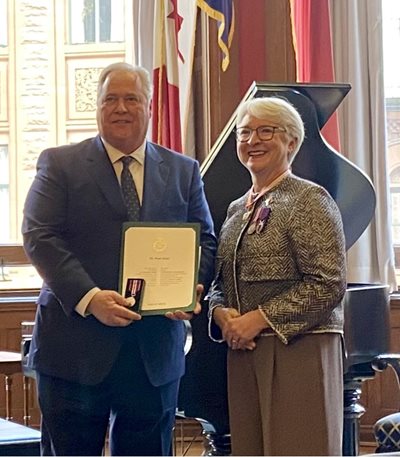
On March 3, I was tremendously honoured to receive the King Charles III Coronation Medal, presented by Lieutenant Governor Edith Dumont at a ceremony she hosted at Queen’s Park. The medal, which marks King Charles III’s coronation in 2023, is awarded to individuals who have demonstrated exceptional service to Canada.
I am immensely grateful not only for this personal recognition, but for the acknowledgment of the vital role the Ombudsman institution plays in strengthening democracy through the protection of people’s rights.
I see it as a tribute to the dedicated team I am privileged to work with and the remarkable organization I am fortunate to lead.
For 50 years, Ombudsman Ontario has served the people of Ontario with distinction. I humbly accept this honour on behalf of all those – past and present – who have contributed to our mission and to the significant results Ombudsman Ontario has achieved for the people of Ontario since 1975.
Stay tuned!
Throughout this milestone year, we will be sharing information through our website, social media and a range of public outreach activities about the many ways our work has helped Ontarians over five decades, as well as the impact the Ombudsman institution has had and continues to have today.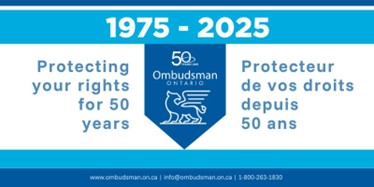
Stay tuned for more all this year as we mark 50 years of protecting your rights!
Ombudsman's message for National Day of Truth and reconciliation, September 30, 2024
(September 27, 2024) Created as a response to Call to Action #80 from the This link opens in a new tabFinal Report of the Truth and Reconciliation Commission, the National Day for Truth and Reconciliation provides an opportunity to reflect on the tragic legacy of the residential school system and honour the survivors and the children who never returned home, their families and their communities.
September 30 is also known as This link opens in a new tabOrange Shirt Day, an Indigenous-led grassroots commemorative day intended to raise awareness of the inter-generational impacts of residential schools. The orange shirt is a symbol of the stripping away of culture, freedom and self-esteem experienced by Indigenous children over generations. The day originated with the story of one former student, Phyllis (Jack) Webstad, who had her new orange shirt taken away from on her first day at the St. Joseph Mission Residential School in British Columbia when she was just six years old.
Public commemoration of the history and legacy of residential schools is a vital component of the reconciliation process. As a province and as a nation, we all have a duty to learn about Canada’s colonial history and continue to forge a path towards reconciliation.
At Ombudsman Ontario we are committed to reconciliation and continue to incorporate recommendations from the Truth and Reconciliation Commission and the National Inquiry into Missing and Murdered Indigenous Women and Girls into our work. This includes putting meaning to Call to Action #57, which speaks directly to educating public servants on the history of Indigenous peoples, by once again holding a learning session for employees.
I look forward to coming together as an Office to expand our knowledge of this history, and to continue towards building substantive relationships with Indigenous peoples based on trust, integrity and respect to advance reconciliation in a good way.
To reinforce our commitment to truth and reconciliation and to provide employees an opportunity to reflect on the history of residential schools, our Office will be closed on September 30 to observe the day of commemoration and reflection.
Focusing on rights – and the future
(June 26, 2024) It is an honour to present my ninth Annual Report as Ombudsman as this Office prepares to mark its 49th anniversary. The time is ripe for both reflection and forward thinking – and this report, fittingly, does both.
It has been a momentous year. Between April 1, 2023 and March 31, 2024, our Office received 27,030 cases (complaints and inquiries) from Ontarians seeking our help. That is almost a record high – surpassed only in 2018-2019, when we received thousands of complaints about the Ontario Cannabis Store in its first few months of operation.
Not only did we receive 2,479 more cases this fiscal year than in 2022-2023, we saw record or near-record volumes in several areas of our jurisdiction, including municipalities, school boards, children and youth in care and French language services. And we were still able to resolve 57% of cases in two weeks or less.
What those four topic areas have in common is that they are relatively new to our organization. Although the very first Ombudsman, Arthur Maloney, urged the province in 1975 to include local government administration in his mandate, it was not until 2016 that Ontarians could come to us with their concerns about municipalities and school boards. And oversight of child protection services and French language services was only transferred to us five years ago, in May 2019.
To see such large numbers of people seek our help in these areas is heartening. Although there can be many factors underlying an increase – or decrease – in complaints, what is undeniable is that more Ontarians now have recourse to their Ombudsman than ever before, for a wider variety of issues. Whether we are recommending solutions, proposing best practices, verifying fair procedures, investigating complex problems, or simply connecting people with the appropriate avenue of complaint, the assistance we provide to Ontarians is indispensable. As this report illustrates, the results we obtain for them are tangible and significant.
New jurisdiction: Five years of progress
In 2019, we created two specialized units within our Office to handle the unique challenges of helping children and youth in care, and monitoring compliance with the French Language Services Act. Both units brought our proven and effective approaches to this work, along with enormous dedication and passion for promoting the rights of young people and Francophones. Five years later, I am proud to say we have seen remarkable results.
Children and Youth Unit
Specialized in speaking directly with children and listening to their concerns about foster homes, group homes and children’s aid societies, our Children and Youth Unit has received nearly 8,000 cases since 2019 (1,722 cases this fiscal year, the second-highest total to date). We also received close to 1,000 cases about youth justice centres in that time, from young people in custody who sought our help.
In addition to the individual results we achieved in these cases, we have also completed 4 investigations regarding children and youth since 2019, and made a total of 112 recommendations, all of which have been accepted. We have seen notable improvements, as the Children & Youth chapter of this report documents. This is largely thanks to what we call “proactive ombudsmanship,” which involves flagging issues and making proposals for corrective action without conducting an investigation.
The Unit, headed by Director Diana Cooke, has worked closely with the Ministry of Children, Community and Social Services to ensure that lessons learned from our investigations and case resolutions are shared throughout the child welfare sector. I also welcomed efforts to reform the use of strip searches in youth justice centres, and proposed further changes in a submission to the Ministry to better protect the rights of vulnerable youth.
Children and Youth Unit staff reach out directly to young people in foster homes, group homes, provincial and demonstration schools, and through children’s aid societies and associations across the province. The Unit’s uniquely specialized teams (the Indigenous Circle, the 2SLGBTQIA+ Outreach Team, and the Black Children, Youth and Families Table) work with specific groups of young people who are over-represented in the system. These teams have also enriched the knowledge and practices of staff across our Office and inspired our internal Equity, Diversity and Inclusion efforts.
It’s important to note, of course, that we are the Ombudsman for ALL children and youth in Ontario. This past year alone, we also helped hundreds of children and their families with matters related to school boards, special education, special needs and much more, as evidenced in the Education and Social Services chapters of this report.
French Language Services Unit
Led by French Language Services Commissioner Carl Bouchard, this unit has also made remarkable progress in promoting the rights of Francophones in five short years. The unit has received some 1,800 cases in that time (including a record 511 this fiscal year). By employing the Ombudsman approach – making direct contact with complainants, reviewing the facts, finding resolutions, flagging issues and conducting investigations when warranted – they have achieved tangible results, documented in 4 dedicated annual reports to date (watch for Commissioner Bouchard’s next one in December).
As noted in the Commissioner’s last report, our Office’s recommendations to improve French language services have prompted progress, as has the Unit’s investigative work. (The Commissioner’s latest own-initiative investigation, focusing on a lack of French in the province’s out-of-home advertising, is completed and a report is being prepared for release.)
Commissioner Bouchard has also worked to engage with the Franco-Ontarian community in all its diversity, making connections with a wide range of French-speaking groups and individuals, from newcomers to seniors to businesspeople to Deaf and 2SLGBTQIA+ Francophones.
Members of linguistic minorities cannot always count on their rights being respected automatically; it requires vigilance and determination to know and insist upon those rights. For Francophones in Ontario, filing a complaint with our Office can be easier and more effective than marching on Queen’s Park or litigating to the Supreme Court of Canada. Making a complaint to our Office is simple, and it can result in better services for all.
And resolving and investigating complaints is only part of what the FLS Unit staff do. Proactive ombudsmanship is also a large part of their work, as they engage with government agencies and community groups on a regular basis. With the support and collaboration of our entire organization, they also ensure a “Francophone lens” is brought to other issues in our purview.
Promoting rights and transparency
These are far from the only examples of our work in promoting the rights of Ontarians, particularly the most vulnerable. This report includes numerous examples of how we helped individuals access much-needed services and aid, and promoted transparency and fairness, the right of access to justice, and the right to see local governments deliberate.
Correctional services
In a year when most of the province’s correctional facilities were filled to – or exceeded – capacity, we received 4,444 cases about them, our top source of complaints. In response, we dispatched experienced staff to resume on-site visits to correctional facilities – a practice that had been halted during the COVID-19 pandemic. They spoke with correctional and health care staff, observed conditions, flagged complaint trends and discussed solutions. I look forward to reporting more on the results of this work in future reports. We are committed to continuing these visits in the coming fiscal year.
Improving local governance
Our Office’s expertise in Ontario’s open meeting rules – which protect the right of the public to see local government in action – has been sought out by municipal officials and residents alike. This past year, our new best-practice guides for municipal integrity commissioners were welcomed by numerous officials. We also brought this expertise and emphasis on transparency to the school board level, publishing our decisions on several closed school board meetings.
Councils, local boards and school boards are important democratic institutions, and we are proud to do our part in clarifying their responsibility to be open to the public. And residents of the North have similar rights, as I pointed out in a March 2024 submission to the Ministry of Northern Development on the subject of Local Services Boards. Such boards have powers to impose fees and taxes and should be subject to the open meeting rules, as well as the scrutiny of my Office as “local boards.”
Police oversight
As of April 1, 2024, our Office now has additional oversight of provincial police complaint and oversight bodies – a long-awaited step forward for civilian oversight. Now, in addition to the Special Investigations Unit, we oversee the Law Enforcement Complaints Agency, Inspectorate of Policing and Ontario Police Arbitration and Adjudication Commission.
Systemic investigations
A key part of ensuring that Ontarians benefit from our investigations is following up to see that recommendations are implemented. As always, this report provides updates on the progress made in several cases. Notably this year, we concluded that the Ministry of the Solicitor General has fulfilled the bulk of the recommendations regarding the use of force by correctional officers in our Office’s 2013 report The Code, as well as those regarding segregation placements of inmates in my 2017 report Out of Oversight, Out of Mind. These changes ensured more protection for the rights and well-being of vulnerable inmates.
My last Annual Report (released in October 2023) summarized the reports we released on two major investigations in the early part of this fiscal year, regarding delays at the Landlord and Tenant Board (May 2023), and long-term care home inspections during the first phase of the COVID-19 pandemic (September 2023). All 137 of my recommendations in those cases were accepted, and in recent months, the relevant agencies have begun reporting back to us on their progress in implementing them. Meanwhile, our investigation into the plight of adults with developmental disabilities who are improperly housed in hospitals is near completion, as is our most recent one, involving the Ministry of Education’s direct payment programs to compensate families for school disruptions.
Indigenous relations
One of my top priorities as Ombudsman is the development and implementation of our Office’s Indigenous Services Plan. We want to learn from First Nations, Métis, and Inuit peoples in Ontario, and have sought input and assistance in the co-development of a partnership strategy that we hope will pave the way for effective exchanges of information between this Office and Indigenous peoples, and lead to positive change.
Our goal is to build respectful relationships with Indigenous peoples and communities and earn their trust in order to be able to provide more services to them. To that end, we have embarked on a journey of learning, beginning with training that enhances our cultural awareness, sensitivity, and understanding. This includes sessions about our shared history from the National Centre for Truth and Reconciliation and learning about Indigenous cultural practices from a Traditional Knowledge Keeper.
Beginning to develop capacity to adequately and appropriately address relevant issues has already enhanced our service for, and engagement with, Indigenous peoples. While there is much more work to be done, we have taken steps to be more responsive to Indigenous peoples in resolving individual matters and flagging potential systemic issues. Recently, for example, members of a First Nation raised concerns with our Office’s Indigenous Circle about difficulties in obtaining birth certificates (see the Certificates & Permits chapter of this report), and we are also looking into issues with the Ontario First Nations HST rebate program (see the Money & Property chapter).
One of the highlights of the past year has been the discussions I have had with Indigenous peoples and communities. I was honoured to be invited to meet with a number of First Nations groups, and members of our team were invited to have information booths at several Indigenous-led gatherings, including the Chiefs of Ontario annual meetings in 2023 and 2024. We recently began the process to recruit a full-time Indigenous Liaison Advisor and Indigenous Services Coordinator to assist with furthering these efforts.
In November 2023, I was deeply honoured to visit Asubpeeschoseewagong Netum Anishinabek (Grassy Narrows First Nation) in northern Ontario to meet with community members and leaders and learn about the conditions they were facing. The three-day visit highlighted the community’s profound trauma and challenges, particularly with regard to the mercury contamination in local waters. I was extremely moved by the stories of hardship and injustice faced by the community and by its resilience and commitment to ensuring the safety of children.
A notable example of this commitment is an innovative program to build homes for at-risk youth and vulnerable families. During our visit, we were told there had been a delay in Hydro One installing the poles to bring electricity to these homes, and there appeared to be a communication breakdown between the community and Hydro One. I reached out to Hydro One’s Ombudsman, and by working together, we were able to communicate the urgency of the situation to the corporation. I was thrilled to learn that the line was installed within the month.
My team and I are actively seeking more opportunities to have good words with Indigenous communities that broaden our mutual understanding and enable the Ombudsman’s Office to optimize its contribution to reconciliation. In the meantime, relevant findings from the Calls to Action from the Truth and Reconciliation Commission and the Calls for Justice from the Missing and Murdered Indigenous Women and Girls report will continue to guide our work.
National and international engagement
Beyond promoting optimal public services and government administration, ombudsman offices around the world have a crucial function as democratic institutions. The 2019 international set of standards known as the Venice Principles describes the ombudsman as an important element in protecting the rule of law and respect for human rights and fundamental freedoms. The ombudsman’s role in “the promotion and protection of human rights, good governance and the rule of law” was also recognized by the United Nations in its 2020 Resolution on the Role of Ombudsman and Mediator Institutions.
In an address last month to the World Conference of the International Ombudsman Institute, European Ombudsman Emily O’Reilly said this role is “fundamentally about the prevention of abuse of power,” noting that this can range from “serious maladministration” to “the failure of a government body to reply to a citizen, or to incur stressful delays in dealing with a matter, or to be careless in the administration of a grant or benefit.”
She pointed out that crises rarely happen overnight but develop over many years, and we as ombudsmen can help by alerting administrations to the potential risks of not taking timely action.
So offices like ours must be visible and vigilant, and come together regularly to share expertise and discuss common issues. We need to support strong, independent ombudsman institutions, and respond to threats that they face with solidarity and strategy.
Ombudsman Ontario has engaged with and supported Canadian and international colleagues for decades. The investigation training we provide remains in demand around the world. The important sharing of information and strategies also allows us to learn from our colleagues and help develop best practices nationally and internationally.
In light of this, our engagement with other ombudsman institutions is embedded into our long-term strategy and I am grateful to be a member of organizations like the International Ombudsman Institute (IOI), the Canadian Council of Parliamentary Ombudsman, and the Forum of Canadian Ombudsman.
I am honoured and privileged to serve as President of the IOI’s North American Region, a role that enables me to keep informed of best practices and emerging issues while promoting the importance of ombudsmanship, good governance and transparency internationally. As North America’s lead representative on this world body, I have emphasized the need to promote appropriate standards (like the Venice Principles) for ombudsman offices, and to continue to collaborate with bodies like the United Nations that can help defend them around the world and emphasize their value to liberal democracy.
Strategy for the future
Lastly, I am excited to include in this report, for the first time, our blueprint for the future. As I noted last year, in the years since our two mandate expansions and the pandemic, our team has worked tirelessly to ensure our Office is providing optimum service to an ever broader spectrum of Ontarians.
This past year, we made significant progress towards reaching our full staffing complement of 186, and over the past few months, we developed an organization-wide, three-year Strategic Plan that will guide this Office through next year’s 50th anniversary and beyond the end of my term in 2026. You will find our Mission, Vision, Values and Principles in the next section of this report, along with our Strategic Priorities.
Our plan prioritizes service excellence and value for all Ontarians, with the aim – as always – of improving public services through our work. I look forward to reporting to you on our progress on these important goals next year.
Statement from Ontario Ombudsman Paul Dubé for Ombuds Day, October 12
(TORONTO – October 12, 2023) Today is Ombuds Day, an annual, internationally observed opportunity to educate and raise awareness among the public about Ombudsman offices like ours – the roles we play, the services we offer, and most importantly, the value we provide.
This year’s Ombuds Day theme, “Diverse in role, united in service,” pays tribute to the thousands of ombudsman offices around the world that function in various capacities: From ombuds who work within organizations, to fully independent parliamentary ombudsman institutions, like the Ontario Ombudsman, who bridge the gap between the people and their government.
What we all have in common is something unique to the Ombudsman institution: Only the Ombudsman takes concerns directly from affected individuals, and leverages them into improved services for all.
Last week, I released our Office’s latest Annual Report, which is filled with examples of how we did just that. We received 24,551 cases – complaints and inquiries – in fiscal 2022-2023, and resolved 54% of them in two weeks or less.
We helped Ontarians with everything from birth certificates and driver’s licences to spousal support, social benefits, developmental services funding and more.
We also reported on four major investigations that have prompted systemic improvements in the child protection sector, in long-term care inspections, and at the backlog-plagued Landlord and Tenant Board. I made a total of 213 recommendations in those cases. All were accepted, and many are already being implemented.
This is in keeping with my role as an independent parliamentary Ombudsman, which is to promote transparency, accountability, fairness and respect for rights in the public services I oversee. As the United Nations has noted, offices like ours play a key role in “the promotion and protection of human rights, good governance and the rule of law.”
Across the globe, we have seen that actions to abolish oversight, to undermine freedom of the press, weaken courts and concentrate power in the hands of the executive can undermine liberal democracy from within. In 2019, an international set of standards known as the Venice Principles was established to protect ombudsman offices around the world that are facing threats, and to bolster recognition of their role in strengthening democracy by overseeing government and the public sector.
This past June, Lieutenant Governor Elizabeth Dowdeswell spoke to members of the Canadian Council of Parliamentary Ombudsman during our annual meeting in Toronto about this very topic. She told us: “You provide a voice for some of the most vulnerable in our society, so that they can be heard. You are a voice for our fundamental rights. A voice for fairness. And a voice for accountability. All of which are critical to maintaining the trust that our democracy is built upon.”
Through the cases we resolve and the stories we tell, she said, we demonstrate that “here in Canada, we have the capacity to take a long, hard look in the mirror, and to make positive, systemic change.”
This is truly something to celebrate on Ombuds Day. But an Ombudsman’s work is really never done. As I noted in my Annual Report, we are seeing increases in complaints from vulnerable people and those struggling to make ends meet. In the first six months of this fiscal year, we have seen a 16% increase in cases across the board. We will continue to work hard to make sure people are treated fairly by their government services. And I and my peers around the world will remain vigilant and support strong, independent ombudsman institutions everywhere.
Value for all
(October 5, 2023) In preparing this year's Annual Report, my eighth as Ombudsman, I am struck by the sheer scope of change that Ontario’s public sector, including my Office, has experienced since 2016.
When I issued my first Annual Report that year, six months after my appointment, the government had just opened a huge swath of public sector bodies – municipalities, universities and school boards – to Ombudsman oversight for the first time. This was an enormous change for the better, extending our ability to promote transparency, accountability, fairness, and a respect for rights. It more than doubled the number of organizations that people could seek our help with, on top of hundreds of provincial ministries, agencies, boards, corporations, tribunals, etc.
Two years later, the government further extended our jurisdiction, to French language services and child protection services, conferring upon us the responsibility to promote and protect the rights of Francophones and vulnerable young people. We assumed that work in May 2019 – 10 months before COVID-19 changed everything for most of the next three years.
It was evident during the pandemic that people needed and relied upon their governments and public services – and our independent oversight of them – more than ever. Those years underlined the literal life-and-death nature of public services and our important role in ensuring they function properly and fairly, even (and especially) in times of crisis.
Now, as the crisis recedes, it is time for public services to build on the lessons learned, to repair the gaps exposed during the pandemic, and reach out to the people who may have fallen through them. For the Ombudsman’s Office, it is a time to exercise the unique, twofold strengths of this institution: The expertise to help a broad diversity of Ontarians overcome the problems they encounter with public services, and the power to help improve those services for the future.
The Annual Report details the stories, trends and lessons gleaned from the 24,551 cases (complaints and inquiries) we handled in fiscal 2022-2023. It illustrates the many ways we helped Ontarians with vital issues like access to justice and obtaining essential supports and services.
As the dust clears from the disruption of two historic mandate expansions and a global pandemic, the value of an essential democratic institution like the Ombudsman in providing stronger, broader, more consistent oversight can now be clearly seen.
Since my last Annual Report, for example, we have released reports on four major investigations, all of which addressed complex organizational issues, and serve to enhance governance in ways that will help many Ontarians in future, especially the most vulnerable:
- Our systemic investigation into oversight of long-term care homes during the pandemic revealed the degree to which the Ministry of Long-Term Care’s Inspection Branch was overwhelmed during the first COVID wave. I made 76 recommendations aimed at ensuring the long-term care sector is prepared for the next, inevitable public health emergency – and all were accepted.
- Our systemic investigation of delays at the Landlord and Tenant Board detailed the ordeals faced by thousands of people on both sides of the landlord-tenant relationship, due to a lack of trained adjudicators, antiquated technology and a host of other problems. I made 61 recommendations to address these issues, all of which were accepted – and the government has already committed $6.5 million toward these improvements.
- Our probe of the troubling case of “Misty,” a 13-year old Indigenous girl who went missing in a Southern Ontario city for several weeks – when she was supposed to be in foster care supervised by two children’s aid societies (CASs) – exposed serious gaps in services for at-risk children in the North, as well as in communication between agencies. I made 58 recommendations in that case, and stressed the need for CASs to incorporate learnings from the National Inquiry into Missing and Murdered Indigenous Women and Girls into their training and decision-making. All were accepted.
- Our review of the near-tragic circumstances of “Brandon,” a boy in the care of the Children’s Aid Society of Toronto, who endured deplorable living conditions and neglect in a family member’s home for years, exposed serious problems with the CAS’s supervision. It has accepted all 18 of my recommendations, and it and other CASs are using the case as a training tool.
Progress in new areas
Children and youth: It is particularly heartening to see the progress made in just four short years by our dedicated Children and Youth Unit, which led the “Misty” and “Brandon” investigations and has done tremendous work in promoting the rights of young people in care.
In addition to modeling methods of youth-focused, trauma-informed approaches to cases that deal with vulnerable young people directly, our Children and Youth Unit also makes special efforts to reach and hear concerns from groups that are overrepresented in the child welfare system – through our Indigenous Circle, Black Children, Youth and Families Table, and 2SLGBTQIA+ Outreach teams. The Unit’s expertise in cases involving the use of physical restraints in child protection settings has also borne fruit, as our staff closely consulted with the Ministry of Children, Community and Social Services in its development of new standards and regulations.
Indigenous services: I am also proud to be making progress on the development and implementation of our Indigenous Services Plan, which is our commitment to constitutionally recognized First Nations, Métis, and Inuit peoples within Ontario. It is a top priority for me to raise awareness and seek to engage with these communities in all aspects of our jurisdiction, including, but not limited to, children and youth in care, justice, housing, health care, education, corrections and natural resources.
Indigenous peoples have a special constitutional relationship with the Crown and provincial governments. In addition to providing assistance to individuals from Indigenous communities, my team and I aspire to play a helpful role in informing nation-to-nation and government –to-government discussions. In recent months, we have had several meaningful conversations and meetings to begin building these important relationships.
French language services: In 2019, the responsibility for monitoring compliance with the French Language Services Act (FLSA), as well as the position of Commissioner of French Language Services, were transferred to the Ombudsman. The objective was to bring the experience and expertise of the Ombudsman’s Office to issues involving the FSLA. At that time, I committed to ensuring that:
- The French Language Services Commissioner would be proactive, visible, accessible, and actively engaged with the community;
- The Commissioner would have a high profile within the Francophone community;
- The Commissioner would operate collaboratively but independently of government, individual complainants, and interest groups;
- We would build a skilled and passionate French Language Services Unit;
- We would make the Commissioner’s role an integral part of the Ombudsman’s public service model;
- We would handle complaints effectively, prioritizing direct contact with complainants in the resolution of their issues;
- The FLS Unit and the Commissioner would have the resources required to do impactful work, be supported by the entire Ombudsman organization, and benefit from a deep pool of expertise;
- The Commissioner and the FLS Unit would have an impact in promoting French language services by monitoring compliance with the FLSA, identifying issues of non-compliance, and contributing to improvements;
- The FLS Unit would do thorough investigations and publish impactful reports with evidence-based solutions to problems; and
- The Commissioner would table separate Annual Reports devoted to our work under the FLSA.
We have honoured all of those commitments and accomplished meaningful results in the promotion and protection of French language services. I am particularly proud of the many constructive changes to which our FLS Unit has contributed. These include the development of bilingual Amber Alerts, simultaneous translation of government press conferences during the pandemic, and the inclusion of accents on drivers’ licences and health cards. They are a testament to the dedication of the French Language Services Unit and the resolute support provided by our entire organization.
This has been a milestone year in French language services, as the “active offer” of services in French is now required under the French Language Services Act. This change recognizes the rights of Franco-Ontarians and reflects several of the improvements our Office has called for since 2019.
Applying the ombudsman approach – engaging directly with Franco-Ontarians, encouraging them to come forward with their issues, promoting their rights, conducting impartial, independent reviews, making evidence-based recommendations and recommending improvements – has been effective, and I am optimistic that we will continue to see improvements in response to our recommendations in this area. Among other things, we are following up on changes resulting from our Office’s investigation of cuts to French-language programs at Laurentian University, and the Interim Commissioner has launched a new investigation into the apparent lack of French in the government’s outdoor advertising. More information will be provided in our next Annual Report on French language services – watch for it in December.
Municipalities: Another not-quite-so-new area where our work and expertise continues to pay dividends is the municipal sector. The 2022-2023 Annual Report details many stories of how we helped individual residents with by-law enforcement issues and the like, as well as vulnerable people seeking fairness from housing authorities and utilities. Meanwhile, as the government has added more accountability mechanisms to municipalities – integrity commissioners, codes of conduct and closed meeting investigators are now all mandatory – our Office has played a critical role in providing consistent guidance to municipalities across the province.
For this Ombudsman, the only thing more satisfying than resolving complaints is preventing them – and one way we do that is through communications products that inform people and agencies of their rights and obligations. For example, we distributed a new edition of our popular Open Meeting Guide to every municipal clerk and elected council member after the October 2022 elections, and we introduced additional guides for municipal codes of conduct and integrity commissioners this summer.
School boards and more: Our voice has been heard at the school board level as well: The government’s new education legislation makes integrity commissioners mandatory for school boards, too – something my Office has long called for. We have made further suggestions to the government to help make these new accountability officers successful, and will of course be there to help anyone who encounters issues with them in future.
I anticipate more constructive results from our newest, ongoing investigation into the plight of adults with developmental disabilities who are being inappropriately housed in hospitals.
I am also hopeful that our recommendations and submissions to the government about improving de-escalation training for police across the province will be incorporated into pending legislative changes this fall.
Stronger together
A recap of the year would not be complete without a nod to my ombudsman colleagues across Canada and around the world with whom I have the privilege and pleasure of collaborating. I am honoured to represent the growing North American ombudsman community as its Regional President on the International Ombudsman Institute’s World Board of Directors. In addition, I am proud to have served this year as President of the Canadian Council of Parliamentary Ombudsman (CCPO).
The work that ombudsman offices do as democratic institutions is not solely to promote optimal public services and government administration. The Ombudsman’s role in “the promotion and protection of human rights, good governance and the rule of law” was recognized by the United Nations in a resolution in 2020. Several organizations that measure and track the quality of democracy have noted a marked deterioration over the past decade, as more democracies are declining, and some are sliding into autocracy. Even Canada’s Chief Justice has warned that the global rise in misinformation threatens national institutions and processes that underpin democracy.
Across the globe, we have seen that actions to abolish oversight, to undermine freedom of the press, weaken courts and concentrate power in the hands of the executive can undermine liberal democracy from within. While legislatures oversee a range of government functions, and courts uphold the rule of law, liberal democracy relies on the independent oversight exercised by roles like the Ombudsman, Auditor General, Electoral Officer, et al.
The role of Ombudsman in strengthening democracy by overseeing government and the public sector has been recognized, since 2019, in a unique international set of standards, referred to as the Venice Principles. They are intended to protect ombudsmen around the world who are facing threats, and emphasize that the Ombudsman is an important element in states based on democracy, the rule of law, good administration, and the respect for human rights and fundamental freedoms.
This past June, then-Lieutenant Governor Elizabeth Dowdeswell spoke about this in an address to my fellow CCPO members that resonated with us deeply – so much so that I have included an excerpt at the end of my Annual Report Message. I and my peers around the world and across Canada will remain vigilant and support strong, independent ombudsman institutions everywhere.
A strong foundation
Finally, I want to recognize the enormous behind-the-scenes efforts that enable the Ombudsman’s Office to have the impact that it does. This past year in particular, our Human Resources, IT and Facilities professionals have managed tremendous post-pandemic challenges, from transitioning us from fully remote to hybrid work, to executing an ambitious recruitment plan. We recently surpassed 90% of our full staffing complement of 186 for the first time since our 2016 mandate expansion, bolstering our ranks of talented Early Resolution Officers and Investigators and enabling us to serve even more Ontarians, even more efficiently. We have reorganized our executive team and are in the course of developing a strategic plan and benchmarks that I look forward to sharing in upcoming Annual Reports. We are also strategically reviewing our extensive communications and outreach efforts to ensure as many Ontarians as possible are aware of and can benefit from our fast, free and confidential services.
The 2022-2023 Annual Report is filled, as usual, with examples of exactly that – the stories of people who brought their issues to us, and how their experiences translated into better public services for others. Their stories deserve to be shared, and shared widely. They allow us to demonstrate, every day, the difference we can make.
Ombudsman's message for National Day of Truth and reconciliation, September 30, 2023
(September 29, 2023) It is essential that as a province, and as a nation, we continue to recognize the tragic effects of residential schools on the Indigenous children who attended those schools, and on the survivors who continue to live with those experiences.
As part of our commitment to reconciliation, we are providing educational opportunities to help our staff learn more about our shared history and the harms that have been inflicted on Indigenous peoples. We are working to establish mutually respectful relationships with Indigenous people across the province and will continue to incorporate recommendations from the Truth and Reconciliation Commission and the National Inquiry into Missing and Murdered Indigenous Women and Girls into our work.
September 30 is the National Day for Truth and Reconciliation, established in 2021 in response to Call to Action #80 from the final report of the Truth and Reconciliation Commission.
September 30 is also known as “Orange Shirt Day”, a day to publicly recognize the history and legacy of residential schools and to honour the children who never returned home, the survivors, and their communities. The day originated with the story of one former student, Phyllis (Jack) Webstad, who had her new orange shirt taken away from on her first day at the St. Joseph Mission Residential School in British Columbia when she was just six years old.
We will again offer educational sessions for everyone who works in our Office this year. We have invited representatives from the National Centre for Truth and Reconciliation to speak with us on the history of missing Indigenous children, unmarked burials, colonial systems and impacts, and intergenerational trauma. We greatly appreciate their knowledge and time.
To reinforce our commitment to truth and reconciliation, to provide an opportunity for employees to reflect on the history of residential schools, and to honour the lives lost, we will close our Office on Oct. 2 in order to observe the day of commemoration and reflection.
A gradual return
(August 10, 2022) It is with cautious optimism that my colleagues and I turn the page on 2021-2022 and plan for a gradual return to the activities and methods of operation that we were forced to curtail with the onset of COVID-19 more than two years ago. Having recruited many new members to our Office, while seeing complaint volumes return almost to pre-pandemic levels, we are re-establishing the in-person teamwork that has always optimized our service to Ontarians.
While the health and well-being of our team has been and remains our top priority, returning to work at our office 2-3 days per week under protective protocols has been a welcome change from the remoteness and separation that we – like so many other Ontarians – have endured over the past two-and-a-half years.
AN IMPACTFUL YEAR
Despite the challenges of working remotely, we continued our compassionate and impactful work this past year, as the stories and statistics in my 2021-2022 Annual Report demonstrate. We received 25,161 cases – complaints and inquiries – between April 1, 2021 and March 31, 2022, an increase of 25% over the previous fiscal year. A substantial number of these continued to be driven by the COVID-19 pandemic – such as vaccine mandates in universities and colleges, and ongoing delays in many of the provincial programs we oversee. But a large portion involved the sort of complex administrative issues that have always been our forte – such as helping families access developmental services or social benefits.
As usual, we resolved the vast majority of these cases without formal investigation, and most of them (52%) within two weeks. As always, helping vulnerable people with difficult or unfair systems was a priority. For example, we escalated the complaints of Ontarians with disabilities who were not able to renew their health cards online because they did not have driver’s licences, and the system has since been changed. Our staff helped numerous inmates access health care services. Recently, we even made sure that Ukrainians fleeing the war in their country were able to cut through red tape and obtain Ontario driver’s licences quickly.
We published two investigative reports this spring – one on French Language Services Commissioner Kelly Burke’s investigation into cuts to French-language programs at Laurentian University, and the other on my investigation of the sudden closure of youth justice programs in Northern Ontario. All of our recommendations in both cases were accepted.
Our work on two highly complex systemic investigations – into delays at the Landlord and Tenant Board and the government’s monitoring of long-term care homes during the pandemic – also progressed substantially, and we look forward to their completion in the coming months.
In the municipal sector, we received a record number of complaints as municipalities dealt with, and sometimes struggled with, the legal and technical aspects of holding virtual and hybrid meetings while respecting the open meeting requirements of the Municipal Act, 2001.
We issued dozens of reports and letters to help municipalities follow these rules, adding to the rich database of decisions available in our Open Meeting Digest online. General issues about municipalities – part of our mandate since 2016 – also continued to generate more cases than almost anything else.
SUBMISSIONS TO GOVERNMENT
Every year, we take advantage of opportunities to comment on proposed legislative changes and issues that affect Ontarians. This is a little-known aspect of the role of the Ombudsman that allows us to leverage our expertise – for example, regarding the monitoring of inmates in segregation, or the use of physical restraints in the child welfare system – to urge improvements. I made six submissions to government between May 2021 and May 2022.
Two of these (noted in my 2021-2022 Annual Report) stressed the importance of ensuring that Integrity Commissioners at the local level – for municipalities and school boards – are mandatory, and have robust complaint protocols that are consistent across the province. Three related to improving regulations designed to protect vulnerable young people, and one reiterated several of my earlier recommendations regarding segregation of inmates. We continue to actively engage with the province on these issues.
CHILDREN AND YOUTH
We also helped an ever-growing number of young people and adults who raised concerns about child protection services – part of our mandate since 2019. Now into its third year of operation, our dedicated Children and Youth Unit is committed to being as accessible as possible to children and youth in care. Our staff are constantly engaged in outreach to inform young people in care about their rights, and service providers about best practices.
Along with responding directly to complaints, the Children and Youth Unit works on many fronts to address issues affecting young people in the child welfare system, receiving updates on legislative developments and policy changes, monitoring Death and Serious Bodily Harm reports, and following up directly with many injured children. Our Office also works with our fellow members of the Canadian Council of Child and Youth Advocates to share best practices and lend our voice to calls for reform.
As well, this unit has started to build an approach to outreach and engagement aimed at addressing issues affecting Indigenous youth and other groups who are disproportionately represented in the child welfare system. Their experience in consulting on cases and with these communities will be key to the development of further outreach efforts by our Office as a whole.
The work we do in this area provides an opportunity to contribute to reconciliation. For example, our recent investigation into youth justice program closures in the North revealed that a lack of engagement with affected Indigenous groups by the province exacerbated the impact of the closures. As I noted in my 2021-2022 Annual Report on that case, it is important to reflect on learnings from the Truth and Reconciliation Commission and the significance of meaningful engagement.
FRENCH LANGUAGE SERVICES
We have spared no efforts in building a passionate and dynamic French Language Services Unit that, with support from across our entire organization, continues to have significant success in supporting Commissioner Burke in the promotion and protection of the rights of Franco-Ontarians, pursuant to the French Language Services Act (FLSA). The Laurentian University investigation is a perfect example of how we marshalled skills and experience from across our Office and applied our evidence-based approach to determine the underlying probIems and propose solutions for corrective action – in this case to two ministries and the university, all of which have committed to implementing the Commissioner’s recommendations. The Commissioner’s second Annual Report, released in December 2021, was similarly well received.
As the Commissioner will explain in more detail in her third Annual Report later this year, we resolve hundreds of cases each year in which Francophones feel that government services have not conformed to the standards prescribed by the FLSA. We intervene when appropriate to promote the right to receive services in French that are simultaneous with and equivalent to services in English.
Despite our hard work and positive outcomes, there are considerable challenges in this work. A key challenge we have faced is the degree of misunderstanding and the amount of misinformation about how an Ombudsman functions and the principles that guide our work – principles that have been codified internationally as the Venice Principles.
As an independent and impartial Officer of the Legislative Assembly, our Office does not take any instructions from any authorities. The French Language Services Commissioner is empowered by that same independence and impartiality. The Commissioner is responsible for the day-to-day operation of the French Language Services Unit, oversees the handling of complaints and conduct of its investigations, and engages in outreach and proactive consultations with Francophone stakeholders.
As a parliamentary ombudsman, we also have “own initiative” or “own motion” powers, which means that complaints are not a prerequisite to investigations. We have used those powers in several instances over the years, most recently to launch our ongoing long-term care investigation. Those powers are available to the French Language Services Unit as an integral component of our organization, and the Commissioner does not require complaints to investigate a matter.
A GLOBAL ROLE
Questions about the role of the Ombudsman are not new, of course. The good news is that the past few years have seen remarkable progress in international recognition of this role as essential to democracy, and a clear set of principles to define it.
Following the 2019 proclamation of the Venice Principles – a set of 25 global standards to ensure stable, independent and effective ombudsman institutions around the world – the United Nations General Assembly endorsed those principles in December 2020 in its Resolution on the Role of Ombudsman and Mediator Institutions.
These declarations – which we have set out in detail in the next section of my 2021-2022 Annual Report, About our Office – are important steps in setting global standards and protections for the ombudsman institution. They enhance the ability of offices like this one to promote fair administration, human rights, good governance and the rule of law. Collectively and individually, my international colleagues and I continue to work on ways to inform our governments, citizens, and stakeholders about those principles, as well as put them into practice through self-assessment and peer review.
In May 2022, I was pleased to be able to join my fellow members of the International Ombudsman Institute’s Board of Directors at our Annual Meeting in New York – our first in-person meeting in three years – where we had productive sessions with several missions and permanent representatives to the United Nations to promote the Resolution and the Venice Principles, and strengthen our ties with the UN.
Such progress is a hopeful and fitting sign for a world that is yearning to overcome the heavy challenges of the past two years. Throughout this time, we have demonstrated through reports like the 2021-2022 Annual Report that independent oversight of public services is essential for the protection of citizens. It is equally important that the concept of independent oversight itself be protected.
BACK TO THE FUTURE
Against this backdrop, I look forward to being able to resume in-person outreach and build on the relationships and initiatives begun before the pandemic – in particular, our work with children and youth, our engagement with Indigenous communities, and our commitment to reconciliation. Most of all, I look forward to the next achievements my team and I will be able to realize for Ontarians as we are reunited – safely and gradually – under one roof.
Reflections on 2021
(December 16, 2021) It is difficult to believe that nearly two years have passed since our organization was forced to leave our physical office space and transition to serving Ontarians remotely. Over this extremely challenging time, I am tremendously proud of the resilience my team has shown and the way we’ve adapted to the many drastic changes to the way we work.
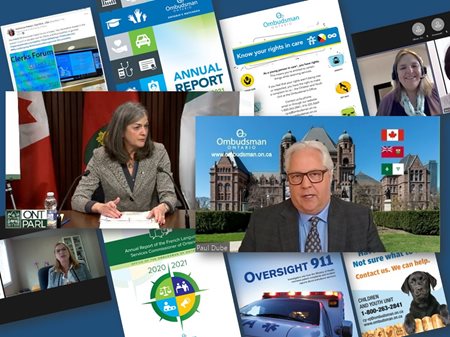
Reports
In late June, I released my Annual Report, the second one we have produced during the pandemic. It highlighted the 20,015 cases we received about services across the public sector. For example, we helped inmates in provincial jails receive timely health care and phone access despite pandemic-related lockdowns, nudged the Ministry of Transportation to deal with the massive backlog of driving tests, and raised concerns about children’s aid societies resorting to call police to deal with young people in their care.
Earlier this month, French Language Services Commissioner Kelly Burke released her 2020-2021 Annual Report, the second since her appointment in January 2020. The government’s recently announced changes to the French Language Services Act appear to echo Commissioner Burke’s earlier recommendations on the importance of planning for French language services, and her latest report builds on these by recommending a self-assessment tool that ministries can use in evaluating their plans.
In May, we also released Oversight 911, the report on our systemic investigation into the province’s handling of ambulance service complaints. I am pleased that the Ministry of Health accepted all 53 of my recommendations to improve its oversight of Ontario’s $1.5-billion ambulance service, and it has already begun to implement some of them.
Investigations
At present, we have several investigations in progress. Although it is enormously challenging and not optimal to do this work remotely, especially on complex files that require a high degree of collaboration among our team and the review of hundreds of thousands of documents, we have found ways to work effectively and safely.
Our Special Ombudsman Response Team is making headway in its complex, systemic investigations of ministerial oversight of long-term care and delays at the Landlord and Tenant Board. The team has interviewed dozens of witnesses remotely and reviewed hundreds of thousands of documents in the course of these investigations.
Our Investigations team is also close to completing the fieldwork, including numerous interviews, related to the probe of the abrupt closure of two youth centres in Northern Ontario in the spring. Our Children and Youth Unit’s investigation continues into the case of a young girl at risk for human trafficking, who went missing from her group home for a significant period of time. And our French Language Services Unit is progressing on its first formal investigation, into cuts to French-language programs at Laurentian University.
Submissions to government
The recent legislative session presented our Office with several opportunities to provide comment and advice to government on pending legislation.
In August, I shared with the Ministry of Municipal Affairs and Housing our suggestions for ways to strengthen accountability for municipal council members. These included standardizing protocols for municipal integrity commissioners, and making their accreditation and training mandatory.
In October, as part of the Ministry of Education’s consultations this past autumn on improving school board governance, I made 14 proposals to help strengthen accountability and transparency. These included standardizing some aspects of trustee codes of conduct and amending the Education Act to ensure consistency in sanctions applied for breaches of codes of conduct.
Municipal meetings
Municipal meetings have changed drastically due to the pandemic, and the issues we deal with as the closed meeting investigator for hundreds of Ontario’s 444 municipalities reflect that. When local councils were forced to shift to virtual meetings – often with only very basic tools and resources to allow the public to participate – our Office quickly responded by sharing expertise and supporting municipalities in keeping their meetings open and accessible. For example, as part of the annual conference of the Association of Municipalities of Ontario in August, we released new videos on best practices for virtual meetings, and I shared similar information at the Clerk’s Forum for the Association of Municipal Managers, Clerks, and Treasurers of Ontario in October.
We share the outcomes of our closed meeting investigations on our website and in our municipal case digest. In 2021, we addressed a surge in complaints relating to virtual meetings and their effects on the public’s ability to observe local decision-making. For example, we reviewed complaints about interrupted livestreams during meetings in Hamilton and the Village of Westport and poor audio quality during a teleconference meeting in Lanark Highlands. We also looked into the failure of several councils to broadcast the portions of their meetings where resolutions were made to proceed into closed session.
Outreach
My team and I have continued to participate enthusiastically in outreach activities with all of our stakeholder groups, as well as with colleagues in other ombuds offices, albeit remotely. For example, our Children and Youth Unit is conducting a series of virtual meetings with youth at foster homes across the Greater Toronto Area as part of an initiative designed to better reach racialized children and youth – a segment of the population that is overrepresented in the child welfare system.
I was also pleased to be invited to share our methods and strategies for success on an international (virtual) stage. In particular, I spoke to the staff of the UK Housing Ombud Service about strategies for conducting impactful investigations; I discussed the positive impact of our work on services for adults with developmental disabilities at the International Ombudsman Institute’s annual world conference; and I participated in a panel hosted by the South Africa Military Ombuds, where I shared best practices for optimizing acceptance of recommendations.
To mark the first National Day for Truth and Reconciliation, my staff and I participated in educational sessions on Truth and Reconciliation (part of our ongoing learning in Indigenous cultural safety), and we closed the Office in order to observe the day of commemoration and reflection.
Looking forward
Workplaces across Ontario and around the world have faced many challenges in this pandemic, and ours is no exception. To be frank, the shift to working remotely has been enormously difficult. It occurred less than a year after we assumed two huge new areas of responsibility – French language services and child protection services – and established two new units to deal with them. Many people in our expanded organization have never met in person or been to our physical office – and recruiting new staff has presented its own unique set of challenges. The consultations and discussions that would typically happen several times a day, as staff support and mentor each other, cannot easily be replicated virtually.
Nonetheless, my team has seized opportunities to work together and help Ontarians throughout this time, finding new ways to connect people with information about public services while in lockdown, developing expertise in rapidly changing pandemic-related policies, and striving to enhance public sector governance at a time when Ontarians needed public services more than ever. Together, we look forward to continuing this important work as we plan for a gradual transition back to the office in the new year.
We remain committed to helping Ontarians by proactively sharing information and identifying gaps in services and processes with the public sector agencies we oversee. If you have questions, concerns, or aren’t sure where to turn, contact us – we can point you in the right direction or help find the information you need.
I would like to wish you all a very happy holiday season – and all the best for a brighter 2022.
Ombudsman’s message for Truth and Reconciliation Day, September 30, 2021
(September 30, 2021) Today is the first National Day for Truth and Reconciliation. It is a day to remember and commemorate the thousands of Indigenous children who were taken away from their communities and forced to attend residential schools – and the many who never returned home.
Since 2013, September 30 has been, and will continue to also be known as, Orange Shirt Day. The day originated with the story of one former student, Phyllis (Jack) Webstad, who had her new orange shirt taken away from on her first day at the St. Joseph Mission Residential School in British Columbia when she was just six years old. Orange Shirt Day has since opened the door to a global conversation on all aspects of residential schools.
This year, we bore witness to an especially painful reminder of Canada’s residential school system and its dark legacy with the discovery of more than 1,000 unmarked graves across the country.
It is important that as a province, and as a nation, we continue to recognize the tragic effects of residential schools on the Indigenous children who attended those schools, and on the survivors who continue to live with those experiences.
As a society, we must not let them out of our collective thoughts and sights, and we must remain committed to educating ourselves about the history of Indigenous peoples, including the history and legacy of residential schools (Truth and Reconciliation Commission Call to Action #57).
I ask Ontarians to join me and my colleagues in ensuring we continue to reflect on the work of the Truth and Reconciliation Commission, specifically around its work on “Missing Children and Unmarked Burials.”
It is also not lost on our Office, given our important role in helping children and youth in care, that Indigenous children continue to be overrepresented in the child welfare system.
We must remind ourselves that reconciliation begins with truth-telling – and confronting often difficult and painful truths – to understand our past, and what concrete actions must go into shaping the future.
As Ontario’s Ombudsman, I and my team stand in solidarity with all First Nation, Inuit and Métis peoples. This week, we all participated in educational sessions on Truth and Reconciliation, part of our ongoing learning in Indigenous cultural safety. On September 30, to reinforce our commitment to truth and reconciliation, to provide an opportunity for employees to learn about and reflect on the history of residential schools, and to honour the lives lost, we will close our Office in order to observe the day of commemoration and reflection.
Our thoughts remain with all those affected by residential schools.
If you require support, the Indian Residential School Crisis Line is available for 24-hour assistance for former residential school survivors in need of emotional support or crisis referral: 1-866-925-4419.
Our service to citizens during the coronavirus emergency
(April 9, 2020) In accordance with the guidance of public health authorities and the provincial government, the office locations of Ombudsman Ontario have been closed since March 16. Despite this, my staff and I continue to work from home during the provincial state of emergency and remain available to assist the people of Ontario.
During this period of pandemic and social distancing that has disrupted our lives so much, I want the people of Ontario to know that my team is working diligently to ensure that we remain accessible and able to help them as much as possible.
Our Executive Management Team (EMT) meets by conference call every morning to review the latest developments and public health news, share updates on the progress of work being performed by each section of our office, find solutions to the challenges they face, and engage in issues management and problem solving with the public and key stakeholders.
Although the workload and challenges have increased considerably, I am immensely proud of the concern and dedication my entire team has exhibited these past weeks for the people we serve, and their commitment to doing what it takes to continue to assist citizens and inform government during these trying times.
Almost all of our staff (more than 100) are equipped with the necessary technology to enable them to work remotely in a technologically secure and effective manner. Our Information Technology team has done an incredible job of keeping us connected and operational while ensuring security of our data and the confidentiality of complainants’ files. We have activated teleconferencing lines to enhance communication among teams and with stakeholders, as well as video conferencing tools that have enhanced internal collaboration and will facilitate interviews for recruitment and investigations.
We continue to receive complaints in all areas of our jurisdiction through our website and by email. While working from home over the past few weeks, we have received some 800 new cases, including more than 300 related to the COVID-19 pandemic alone.
Complaints are being received and responded to according to our normal processes, with the most urgent ones triaged for quick response. Although response times in some cases may be slower because the officials with whom we regularly interact are also working remotely, we are achieving critical results.
One of my main preoccupations since the pandemic was declared has been how to remain accessible to the most vulnerable citizens in our province.
Children and youth in care or custody, for example, may not have online access. Our Children and Youth Unit staff have cell phones and can be reached while working remotely. Young people in care or custody can leave a message at 1-800-263-2841 or 416-325-5669 – all calls are being reviewed. In the past few weeks, the Unit has handled almost 100 new cases. We are also in regular contact with youth justice facilities regarding the effect of this situation on youth in custody, and officials there are responding to our inquiries promptly. The Children and Youth Unit also continues to monitor and follow up on reports of death or serious bodily harm related to young people involved in the child welfare system.
I have serious concerns about the potential impact of coronavirus on correctional facilities, so we have also arranged to set up special phone lines to enable inmates to reach us. This was essential, because their normal points of contact with us – our toll-free phone line and mail-in forms provided through jails – aren’t accessible during the present shutdown. (We typically receive thousands of complaints from inmates – 5,711 in 2018-2019).
Several of our Investigators have been issued cellphones so that, beginning next week, inmates can call them during designated hours. Correctional facilities will post these new numbers near the phones used by inmates. This constructive solution is the result of ongoing efforts between our Office, the Ministry of the Solicitor General and senior officials in correctional facilities to keep abreast of the serious risks that coronavirus poses to inmates and correctional staff.
In the meantime, we have responded to several complaints from family members concerned about loved ones who are in correctional facilities. The Ministry has been forthcoming with us in providing its plans and safety protocols to deal with the pandemic, and we have been able to provide some of this information to reassure many of those who came to us with concerns.
We continue to help Ontarians resolve complaints quickly and effectively, as we do with thousands of cases every year. (Of 27,419 cases in 2018-2019, 62% were resolved within two weeks). Our staff have used their expertise in navigating bureaucracy to help people sort through the rapidly changing and sometimes confusing information about public services during this time.
For example, a woman whose job has been deemed an essential service during the pandemic sought our help when her driver’s licence was suspended due to a medical matter and she was temporarily unable to get to work. Our staff were able to facilitate the reinstatement of her licence within a few days.
We reassured one woman whose driver’s licence expired while she was self-quarantining, by pointing her to information about the Ministry of Transportation extending all driver’s licences due to expire after March 1. And we eased the concerns of a man who couldn’t pay his property taxes while in quarantine, by confirming with its municipality that it planned to waive late tax payment penalties.
As well, we are assessing several complaints from the public and frontline staff that relate to COVID-19 health and safety protocols in a number of provincial and broader public sector bodies. The Directors of our Investigations, Legal Services, Children and Youth and French Language Services teams hold regular teleconferences with senior officials in several ministries to bring issues to their attention, learn about their pandemic planning measures, and share information about complaint trends.
We continue to investigate complaints about closed municipal meetings, and engaged with the Ministry of Municipal Affairs and Housing regarding municipal councils holding virtual meetings during this emergency, to ensure the requirements for open meetings are balanced with public safety.
Our systemic investigations into Landlord and Tenant Board delays and the province’s handling of ambulance service complaints continue, and reports will be issued upon completion. Timelines for these will be determined by the ability of the organizations in question to provide the necessary evidence and, once the investigations are complete, to respond to our findings. In dealing with these organizations, we make it clear that while we understand the pressures and challenges they are facing during this time, this does not prevent us from fulfilling our oversight responsibilities.
The French Language Services Commissioner and her Unit remain vigilant and engaged to ensure that, among other things, government communications during this crisis are provided in French as well as English. For example, the Commissioner recently wrote to the Premier to underscore the heightened importance of government messages being communicated in French as well as in English during this crisis. In his response to the Commissioner, the Premier committed to ensuring all information about COVID-19 is available in both languages, that Telehealth service is available in French, and that ministers speak French where possible at news briefings. He wrote: “As you noted, Francophones in Ontario have the right to receive communications services in French, equivalent to those offered in English. This is even more critical at this time of crisis.”
We are also continuing to build the French Language Services Unit, the Children and Youth Unit, and our Early Resolutions team. We are actively recruiting Early Resolution Officers and Investigators through our online hiring portal, and interviews and tests are being conducted via videoconference. Our Human Resources and Administration team is working steadily to find the right people to place in the right positions.
It goes without saying that during a state of emergency, timely and effective communications become more important than ever. Our Communications team has been busier than ever, helping keep stakeholders informed and aware, in both English and French.
I want the citizens of Ontario to know that the Ombudsman’s Office is here for you and working hard to respond to your needs. Furthermore, with the knowledge gained during this exceptional time, we are – and will continue to be – uniquely positioned to inform the government about the impact of its administrative actions and assist it in optimizing its responses.
As always, it is a privilege to lead such a professional and passionate team that is playing a key role during this crisis, and remains more committed than ever to serve the people and institutions of Ontario.
COVID-19 – Message to the public
(March 23, 2020) As I write this, Ontario is in an unprecedented state of emergency, due to the global outbreak of the COVID-19 coronavirus. Millions of people are working from home and practicing “social distancing” as frontline health care workers and public sector leaders work to contain the outbreak and ensure that tests and treatment are available for those who need them.
I have always said it is a privilege to the work we do, but that is especially true in this context. We public servants who are working from home during this crisis are committed to doing our best to assist those who require assistance from their government more than ever.
With our public services greatly challenged at all levels, and leaders having to make decisions swiftly, based on rapidly changing information, we all must do our part. For the Office of the Ombudsman, this means continuing to fulfil our important role in helping Ontarians and public sector officials through the crisis.
My team and I are working from home, as advised by public health authorities. As always, while we are not on the front lines or involved in political decisions, we are here to help by sharing information and identifying gaps in services and processes that result in people being treated unfairly or falling through the cracks.
While delays should be expected as all public services adapt to a new reality, we are working very hard to ensure that Ontarians continue to have access to us. The logistics are challenging but every effort is being made to be as accessible and responsive as possible.
We are receiving and responding to complaints filed online and by email. We are working proactively with the provincial and public sector bodies we oversee to flag trends and serious issues that Ontarians have raised with us.
First and foremost, we are looking out for the most vulnerable and how they are being affected by this crisis. We have received many complaints related to the provision of services during this state of emergency, and as always, we are resolving them as quickly as possible by referring people to the information they need or the officials who can help them, or by directly contacting the agency in question.
Our Children and Youth Unit is continuing to respond to phone calls from children and youth in care (as well as online complaints), and we have alerted all children’s aid societies and other child protection providers to remind them of their duty to let youth in care know we are here for them. We can hear their concerns, investigate problems, and ensure their rights are respected.
We are also in close contact with the Ministry of the Solicitor General about potential effects of COVID-19 in correctional facilities. Our staff resolve more than 5,000 complaints every year from inmates, and our experience and relationships with correctional officials are already proving valuable as the correctional system deals with this unique situation.
We are also keeping an eye on how the broader public sector bodies we oversee – municipalities, school boards and universities – are coping with this crisis, and offering guidance where possible.
For example, our municipal team, who are experts in the rules that require local councils to have open meetings, were alerted to gaps in the law that hampered municipal councils’ abilities to hold “virtual” meetings. We raised this with the Ministry of Municipal Affairs and Housing, which was working on emergency legislation to address this (it passed the next day). We will review the application and effectiveness of these new rules, to ensure local governments remain transparent and accountable as they navigate this difficult time.
And from the start of this crisis, our French Language Services Unit – under the leadership of Commissioner/Deputy Ombudsman Kelly Burke – has worked proactively to ensure that Franco-Ontarians are receiving public health information in their own language, as required by law. Commissioner Burke published a statement about this and her Unit’s recent activities on March 20, the International Day of the Francophonie. As she notes, we are encouraged by the efforts of provincial authorities thus far to ensure the messages they put out are always in English and French. We will remain vigilant and engaged, however, to ensure the offer of French language services is fair and aligned with legislative expectations.
Meanwhile, our ongoing investigations, including our systemic investigation into delays at the Landlord and Tenant Board, are continuing, even as many of the relevant public servants, like us, are working from home. Our Special Ombudsman Response Team is reviewing evidence and interviewing witnesses remotely, as well as reviewing the impact of the state of emergency on this issue.
Although all of our general outreach activities have been cancelled for the foreseeable future, we are doing our best to make sure we are accessible to Ontario citizens and those who provide public services to them. To that end, we are still hiring for several open positions, including reviewing resumes and testing applicants. And of course we are maintaining our social media channels, monthly e-newsletter and website to keep you informed.
I am in regular touch with my fellow ombudsmen across Canada and around the world as we all seek insight about best practices that could benefit our citizens and public officials in weathering this storm.
As always, I encourage anyone who needs our help with the administration of Ontario public services to contact us online, and we will do our best to respond. We look forward to returning to our offices and doing so in person soon.
Looking back on 2019 and ahead to 2020
(December 30, 2019) As we close 2019 and look ahead to a new decade, it’s a fitting time to reflect on the recent historic changes to the Ombudsman’s Office, and to discuss our priorities for 2020.
In 2019, Ombudsman oversight was extended for the first time in Ontario’s history to child welfare and French language services. In adding these areas to our mandate, we have worked to combine our proven Ombudsman techniques of complaint resolution and investigation with the expertise of the staff who joined our team from the former offices of the Child Advocate and French Language Services Commissioner.
Across all units, we seek to promote fairness, transparency and excellent customer service – not only in the public sector bodies we oversee, but in our own work as well.
Over the past year, in both these new areas and in our work with provincial government bodies, municipalities, universities and school boards, we have also been able to ensure the rights of vulnerable people were respected, and their voices heard. The people we helped were struggling with administrative problems in all types of organizations, whether they were young people in care, Indigenous and transgender inmates in correctional facilities, families seeking help with developmental services for loved ones, or French-speaking Ontarians seeking public services in their language.
We also promoted democratic principles of transparency and accountability at the local level in more than a dozen investigations of municipal closed meetings, an in-depth investigation of a deeply unfair process for hiring a chief administrator in Niagara Region, and a review of a controversial school closure in North Bay. And we did all this while dealing with a 30% surge in complaints in fiscal 2018-2019 over the previous year.
It has a been a challenge, but also an enormous privilege, to lead this Office at such a key time – and to have the opportunity to extend Ombudsman services to areas where we may not yet be well known. In the coming year, as we continue to share stories about the improvements that our work has prompted in a wide spectrum of public services, our goal is to help Ontarians in even more communities and walks of life, including in Northern and Indigenous communities.
As I noted in my Annual Report in June, I have made it a priority to reach out to Indigenous leaders and community members in an effort to assess the relationship between provincial institutions and Indigenous people and determine what role my Office can play in reconciliation. We will continue seeking input and dialogue in 2020. In the past two months, I had the opportunity to speak to the Indigenous Child and Family Well-Being Conference on Rama First Nation, as well as to meet Nishnawbe Aski Nation Grand Chief Alvin Fiddler in Thunder Bay. I look forward to learning more through future discussions as my Office develops our Indigenous Action Plan.
We will continue to focus on helping Ontarians who have nowhere else to turn, who need our expertise in rooting out systemic problems in government administration, navigating complex and unfair bureaucracies, and making public services work better.
Of course, none of this can happen without the hard work of our passionate and committed staff. I am endlessly grateful for and inspired by the drive and the passion of our team, particularly after such an eventful year.
On that note, I also want to recognize the work of one key member of that team, Gareth Jones, the founding director of our Special Ombudsman Response Team, which has led all of our systemic investigations since 2005 – who is retiring in January 2020. Gareth’s extensive experience in investigations and dealing with bureaucracy helped this Office gain its international reputation for excellence. His knowledge, strategic thinking, and leadership style earned him the respect and credibility he enjoys with our team and around the world. We will launch a search soon to fill his sizable gumshoes.
Last but certainly not least, I know there is much public interest in our recruitment of a new French Language Services Commissioner, who will lead our French Language Services Unit and promote the linguistic rights of franco-Ontarians. Our process is very nearly complete, and I look forward to announcing the new Commissioner’s appointment in January.
Winter 2019
(December 31, 2018) The end of the calendar year is a fitting time for our office to review its accomplishments and impacts on governance in Ontario, and to look forward to the tremendous opportunities and challenges that we will take on in the near future.
There is no doubt that 2019 is shaping up to be one of the busiest and most challenging years in our office’s history.
We are entering a brand new era of oversight with the changes announced in the government’s fall economic statement, which will extend our oversight to children’s aid societies and French-language services by May 1 at the latest (the exact date has not yet been proclaimed). We are committed to devoting the office’s 43 years of experience to these new areas. What’s more, the addition of staff from the offices of the Child Advocate and French Language Services Commissioner, who bring extensive knowledge and expertise in these fields, will become an integral part of our office, enhancing the vitality of our organization and injecting new talent and energy into our work.
As we broaden our scope, Ontarians in all areas we oversee can expect the same rigour for which our office is known in impartial investigations, confidential complaint resolutions, and recommendations for positive changes in the public sector.
To get a sense of these results, and some of the other work we’ve done in the past year, you can read my 2017-2018 Annual Report (the 2018-2019 version will be out this coming June). But I would like to recap some of the highlights here, as well as some of our office’s more recent achievements.
Of note is the efficient and effective way we handled over 21,000 complaints and enquiries, resolving 63% within two weeks.
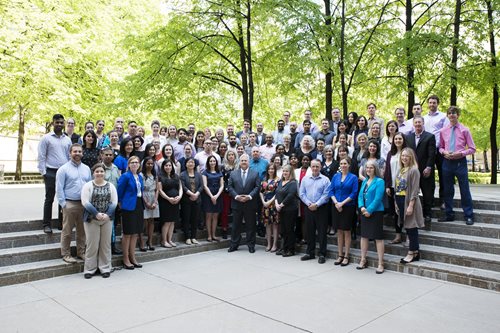
Our Special Ombudsman Response Team (SORT) has also been working diligently this year, in multiple levels of government.
In an event that caught the attention of media around the province, a journalist was ejected from a municipal council meeting and had his laptop seized by the Regional Municipality of Niagara in December 2017. Our investigation and July report, "Press Pause", found that the region’s actions were unreasonable, unjust, wrong and contrary to law – and a significant violation of journalistic rights and freedoms. The region apologized and made changes, following my recommendations.
We’re also investigating matters related to the hiring of the region’s Chief Administrative Officer, so keep an eye out in 2019 for that (and sign up for our newsletter to be the first to know about any investigation developments).
Our investigations of closed municipal meetings also continue in the context of an amended law with new exceptions, and our new online search tool for those decisions is due to be unveiled in late January.
At the provincial level, in September I released "Suspended State", my report on how the Ministry of Transportation notifies drivers about licence suspensions and reinstatements, and provided 42 recommendations to help ensure drivers are aware that their licences can be suspended for non-payment of fines.
In one case detailed in the report, a woman was unknowingly using a licence that had been suspended for four years, which ended up costing her hundreds of dollars in reinstatement fees – as well as time off work – as she had to repeat the graduated licence system meant for novice drivers. I recommended several changes to improve how the Ministry tracks its notices and allows drivers to check their licence status. I also recommended that Ministry staff have discretion to waive the graduated licencing requirements in some circumstances.
The Ministry agreed to my recommendations and has started to implement them. We will update the public on their progress in our next Annual Report. Meanwhile, SORT is wrapping up our investigation (announced in spring 2018) into how the province deals with ambulance service complaints. Watch for our report in 2019.
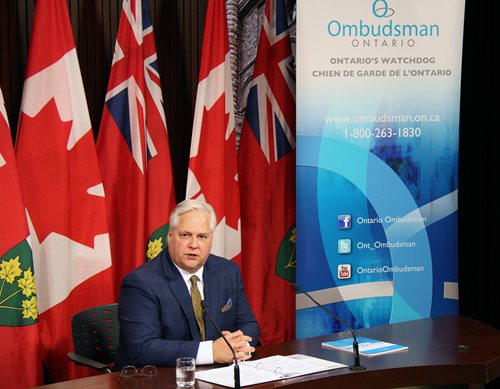
Another major provincial issue we tackled this year stemmed from a national change: The legalization of cannabis across Canada on October 17. Within about a week of legalization, we began receiving complaints about issues with the Ontario Cannabis Store (OCS) – and within a month, we received more than 2,300 complaints about delayed deliveries, poor customer service, and billing problems.
This was an excellent opportunity for our staff to put their early resolution skills into action. As we do with many persistent provincial issues, we established regular contact with senior staff at the OCS and flagged complaint trends to them. They in turn reported back to us regularly on what they were doing to resolve the issues we identified. Complaints have dropped significantly as the OCS has addressed these matters, but we continue to monitor complaints and emerging trends. You can read our initial press release about the OCS on our website.
This resolution approach is similar to that we use for complaints about correctional facilities. Throughout the past year, senior staff and I have visited correctional facilities across the province as part of our ongoing efforts to resolve complaints and systemic issues at the frontline level whenever possible. Correctional facilities are the top source of complaints to our office (more than 5,000 in fiscal 2017-2018), but our staff work efficiently with them to ensure urgent matters of health and safety are flagged, and potential systemic problems are dealt with before they grow. One example of a systemic issue in this area is the monitoring of inmates in segregation (solitary confinement), which sparked my investigation and April 2017 report, "Out of Oversight, Out of Mind". The Ministry of Community Safety and Correctional Services has continued to report back to me this past year on its progress in implementing my recommendations to reform the use of segregation.
A review of the year would not be complete without noting the broad reach, impact and reputation that the Office of the Ontario Ombudsman has around the world. Not only is the expertise of our office sought out by similar oversight bodies throughout Ontario and Canada, we also help train watchdogs across the globe. Outreach and engagement with other ombudsman offices makes us better at what we do and enhances our ability to serve Ontarians. As we do every year, we hosted our “Sharpening Your Teeth” course for some 80 ombudsmen and administrative watchdogs in Toronto in November, and conducted similar training (always on a full cost-recovery basis) in Manitoba, Alaska, Australia and the Netherlands.
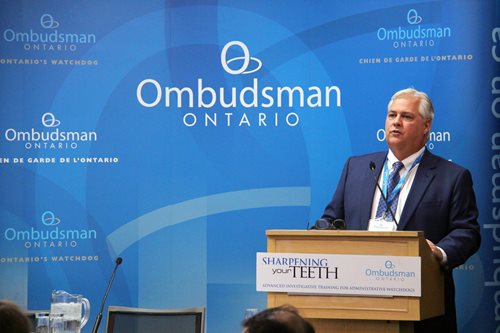
We also had the honour of hosting the annual This link opens in a new tabInternational Ombudsman Institute board meeting in May, to mark the 40th anniversary of that organization’s founding in Canada. The productive discussions on best practices and issues of importance in our field included ombudsmen from the U.S., Asia, Europe and Africa.
In the interest of sharing valuable learning experiences, our office invited several other oversight bodies to participate in a course on complaint management in Toronto, delivered by a trainer from Australia’s New South Wales Ombudsman. In November, I was invited to Australia for an investigations symposium, where I spoke about our work in helping to improve services for people with developmental disabilities; and was This link opens in a new tabfeatured in The Mandarin, an online news source for public sector leaders.
As I reflect on the past year and the new year to come, I know there are significant challenges ahead, but also even greater opportunities to enhance public sector governance, and I look forward to doing it with our strong and growing team.
Summer 2018
(August 13, 2018) As this summer draws nearer to a conclusion, I am taking stock of what has been a very busy and eventful few months.
In June, we published our latest Annual Report, which illustrates our work on so many vital issues and highlights the assistance we have provided to people and public sector bodies across Ontario.
In July, my report on our investigation of events at a December 2017 meeting of Niagara regional council received considerable attention, and I am pleased that the recommendations therein are being acted upon.
While we kept an intentionally low profile during the recent provincial election campaign, we continued our work of helping people navigate bureaucracy and working with the administrative branch of government to help officials optimize transparency, accountability, and fairness.
With roughly 1,000 public sector bodies within our jurisdiction, the scope of our work is vast. Yet there is one common issue I see running through all aspects of our jurisdiction, and that is the prevalence of issues related to mental health. For instance, our office regularly hears from families struggling to access mental health supports for loved ones.
Whether at the local or provincial level, we continue to see significant numbers of people struggling to access the supports and services they require. The result is a tremendous strain on individuals, families, educators, employers, health care professionals, the police, and correctional services, to name just the most obvious.
In addition to helping hundreds of families and individuals address gaps in mental health services, we have also dealt with the impact of these gaps on first responders and correctional officers. In our systemic investigations, we have long recognized the need for additional training and resources for first responders – front-line police and correctional officers – in order to deal effectively with the challenges they face in this regard.
This past February, during hearings on Bill 175 (which was later passed into law as the Safer Ontario Act), I made a submission flagging gaps in the proposed legislation and stressing the need to recognize the government’s commitment – made in response to my 2016 report, "A Matter of Life and Death" – to train and require police to use de-escalation techniques when dealing with persons who have a mental illness or are otherwise in crisis. I also noted the need to for a legislative commitment to create a new use-of-force model that would help enforce and standardize de-escalation techniques across the province. (Read the full submission, "Oversight Enhanced").
The event that sparked that investigation and report was the death of 18-year-old Sammy Yatim, who was alone on a Toronto streetcar, in crisis and holding a small knife, when he was shot and killed by police in July 2013. My report, which reviewed dozens of similar cases dating back 20 years – and several more such deaths that occurred after 2013 - made 22 recommendations, and all were accepted by the Ministry of Community Safety and Correctional Services. Their efforts to implement them are ongoing – for instance, as noted in our Annual Report, some changes to the Ontario Police College curriculum are expected to be in place soon.
Improvements also continue to be made to address the treatment of inmates who have mental health issues and other challenges, in the wake of my April 2017 report, "Out of Oversight, Out of Mind", which focused on the province’s use of segregation (solitary confinement) in its correctional facilities. Among the systemic challenges our investigation uncovered is that many inmates who are held in segregation have mental health issues (which are often brought on or exacerbated by such conditions), and correctional officers often more appropriate options for housing them, as well as training to deal with their symptoms.
Mental health issues also present serious challenges for many of the individuals and families who come to us for help in accessing support and services for those with “dual diagnosis” - mental health issues in addition to developmental disabilities – is so common.
It has been two years since we released our report "Nowhere To Turn", which revealed that some individuals were ending up in long-term care homes, homeless shelters and even jail because their families were unable to find appropriate care or placements for them. The Ministry of Community and Social Services accepted all 60 of my recommendations; it has already implemented many of them and continues to work on the balance and report to us on its progress. When we receive complaints from people who have ongoing issues in this area (almost 300 have come in since the release of our report), our staff respond on an urgent, individual basis, working to connect people with appropriate help in the system, which can be particularly challenging in cases of dual diagnosis.
For example, one mother sought our help after waiting years for a community residential placement for her adult son, who has a developmental disability, schizophrenia, and difficult behaviour, and had been living in a hospital psychiatric ward since 2010. Our inquiries revealed the Ministry was aware of the case, but had failed to include the man in its residential funding plan. After our intervention, a residential placement was found for him in a local community living home with special supports.[1]
We continue to monitor and meet with Ministry officials on a regular basis to assist with individual cases and ensure the implementation of the rest of the report’s recommendations. Among other things, the Ministry has been developing communication tools to enhance awareness of developmental disabilities and dual diagnosis among justice sector staff and first responders.
The Office of the Ombudsman of Ontario is uniquely positioned to be able to spot systemic problems and issues amongst the more than 20,000 complaints we receive every year from Ontarians about their public sector bodies. We are committed to continuing to work with these bodies to help address service gaps and flag brewing problems, to monitor their progress as they make improvements, and to provide input on new pieces of legislation.
[1] Ombudsman AR 2017-2018 – page 30.
Winter 2018
(March 19, 2018) While we may not have been making many headlines the past few months, it has been a busy winter for our office!
As we will demonstrate in our Annual Report, which we plan to release at the end of June, our work promoting transparency, accountability, and fairness never stops - even if much of it goes on without publicity or fanfare. From our referrals and helping citizens navigate bureaucracy, to submissions and consultations on policy development, to large-scale systemic investigations, we play a crucial role in driving positive change and enhancing governance all around the province.
We have surpassed 9,200 complaints about municipalities, universities and school boards since we began overseeing those sectors, in addition to thousands of provincial cases. Scores of complex files – especially those including challenging provincial, municipal, and educational issues - have been handled in a professional and collaborative manner by our staff, and most are resolved efficiently through referral or early resolution. Our municipal open meeting investigations continue to provide the opportunity to promote transparency while building relationships with stakeholders, and later this year we will be launching a digital Digest of these cases.
Our submissions and recommendations to improve policing and corrections were reflected in new legislation that will protect human rights and potentially save lives. In our submission to the committee reviewing Bill 175, the Safer Ontario Act, we flagged gaps in the new policing legislation, warning that they could undermine strong civilian oversight of police. In early March, the bill received royal assent, taking some of our recommendations into account. When the new legislation is fully in force, our office will have the power to take complaints about the three police oversight bodies in Ontario. The new legislation also reflects a recommendation in my 2016 report, “A Matter of Life and Death”, to require police have training to de-escalate conflict situations.
New legislation aimed at reforming the province’s correctional services was also introduced recently. The Correctional Services Transformation Act proposes that segregation be strictly limited to no more than 15 days and defined as any type of custody where an inmate is isolated for more than 22 hours a day. I am encouraged by this bill, as I recommended both of these changes in my 2017 report, “Out of Oversight, Out of Mind”, after our investigation into the tracking and reviewing of segregation placements.
Our Special Ombudsman Response Team has also been hard at work investigating how the Ministry of Transportation communicates licence suspensions and reinstatements to drivers who were suspended for unpaid fines. Another investigation, into an incident at a Niagara council meeting when a journalist and a citizen blogger were reportedly asked to leave the premises and had their property seized, is wrapping up. Keep an eye out for updates on these investigations as we’ll be sharing developments regularly through our Newsletter and in our Annual Report in late June.
And our team has been busy representing our office all across the province. You may have seen our staff at the Rural Ontario Municipal Association conference, the Ontario University Registrars’ Association annual conference, community and career fairs, and even a drainage convention. We also recently provided customized Sharpening Your Teeth courses to the Mohawk Council of Akwesasne and the French Language Services Commissioner, and have similar plans later this year for groups in Canada and abroad. The spring will continue to be packed full of engagements as we work to reach as many people as we can, and in turn, impact the lives of Ontarians in a positive way.
We have also met with officials at a number of the province’s correctional facilities, including the Ottawa-Carleton Detention Centre, the Ontario Correctional Institute and the Toronto South Detention Centre. These observational visits provide us with an opportunity to see the infrastructure, living spaces and conditions of confinement firsthand, and meet with stakeholders. Most complaints we receive about correctional facilities are quickly resolved, but our staff flag urgent matters of health and safety, meet quarterly with senior officials to discuss complaint trends, and monitor potential systemic problems.
In the midst of all this activity and growth, maintaining consistent communication with and providing information to the public and stakeholders is an important task. To that end, we have created new municipal tip cards, which are already helping inform council members and citizens about municipal best practices, local complaint processes and more. We are also working on new brochures and other informational materials. These are all available on our website to download, or you can contact us to request your own copies.
To stay up to date with our office during these busy times, subscribe to our Newsletter, follow us on This link opens in a new tabTwitter, like us on This link opens in a new tabFacebook and This link opens in a new tabLinkedIn, and check our website for regular updates.
Fall 2017
(November 15, 2017) Welcome to our new home on the web! We are delighted to be revealing our brand-new website to the public today. After months of work, this new site offers a much-improved experience for people learning about our work or looking to make a complaint. Our goal was to make it more accessible, responsive across devices, and much simpler and easier to navigate. We hope you enjoy it. In the spirit of openness and accountability, we also hope you reach out to us directly if you notice any glitches, like broken links or missing pages. Let us know and we would be happy to look into it.
This fall has been productive. In early November, a new package of policing legislation was tabled by government. We were encouraged by the government’s proposals to ensure consistent police training and standards across the province, and the legislation is a welcome response to numerous recommendations our office has made to improve the oversight and accountability of policing. In particular, the proposed police oversight changes will extend Ombudsman jurisdiction to all three revamped oversight bodies, as I recommended in my submission to Justice Michael Tulloch’s review last fall. As well, they reflect my recommendation that these bodies collect demographic information regarding incidents between civilians and police. My office will review the legislation closely and will make further submissions during the legislative process to assist in its development as warranted.
Our Special Ombudsman Response Team has also been working diligently on our investigation into how the Ministry of Transportation monitors and communicates with drivers whose licences are cancelled or suspended, including how it co-ordinates with ServiceOntario. The field work has been completed, and the preliminary report is being drafted as we speak, after which it will go to the Ministry of Transportation for comment.
Our team has been criss-crossing the province to represent our office at outreach events. We appreciate these opportunities, because they give us a chance to speak directly with stakeholders and the public, and explain more about how we work and how we can help. For example, our staff attended the Parents Engaged in Education Dream Big! event in Markham in October (watch for our piece in their December newsletter); answered questions at the Developmental Services Ontario fair in Toronto; spoke to participants at the Older Adult Centres’ Association of Ontario fair in Mississauga; and provided information to municipal officials at the Ontario East Municipalities Conference in Kingston and the Francophone Municipalities of Ontario conference in The Nation.
We spent time with international oversight offices, too. We provided our investigative training course, Sharpening Your Teeth (SYT), to oversight agencies in St. John’s, Newfoundland, and I spoke at the Forum of Canadian Ombudsman’s Essentials for Ombuds professional developmental course in Toronto. I also had the chance to share expertise with police oversight professionals at the National Association of Civilian Oversight in Law Enforcement conference in Spokane, WA and fellow ombudsmen at the United States Ombudsman Association Conference in San Antonio, TX. We also presented our annual SYT course in Toronto, welcoming 80 watchdogs from across Canada and around the world, including the Bermuda and Botswana ombudsmen. And, I was pleased to meet with the Netherlands Ombudsman at our office to share best practices and discuss common challenges.
Meanwhile, our team has been busy with investigations of closed municipal meetings. Since I joined the office in April 2016, we’ve reported on 47 such investigations, making scores of recommendations to improve municipal governance. To that end, we are also working on a brand-new digital digest of these cases. The Open Meetings Digest will be a fully searchable, easy-to-use database of the hundreds of decisions we have made in closed meeting investigations since 2008. This will be the first digest of its kind in Ontario, and we hope to have it ready for launch in the coming months. We anticipate it will become a much-perused resource for municipal councils and anyone interested in this area of municipal law, or open meetings in general – especially as new changes to the open meeting requirements in the Municipal Act come into effect in the new year.
As we head into December, watch for our top 10 moments of 2017, which will be released in a few short weeks at the end of the year. And don’t forget to stay up to date by following us on This link opens in a new tabTwitter, This link opens in a new tabFacebook, and This link opens in a new tabLinkedIn, and signing up for our newsletter.
Summer 2017
(July 5, 2017) It’s hard to believe summer is already more than half over, with the return to school almost upon us.
With that in mind, we released the report on our first school board investigation just last week. “The Route of the Problem” examined the Toronto District and Toronto Catholic District school boards’ oversight of student busing, and their response to delays and disruptions at the start of the 2016-2017 school year.

As you might recall, early in the 2016 school year, we began to receive complaints about Toronto families experiencing chronic busing delays, and parents who were scrambling to get their children to school when their buses didn’t show up at all.
We launched an investigation and what we found was troubling. The Toronto Student Transportation Group, which organizes busing for the two boards, was aware of the potential for service delivery issues in the weeks leading up to the first day of school. However, it failed to heed the early warning signs that dozens of bus routes had no drivers.
And then, when the crisis materialized, both the boards and the Transportation Group were wholly unprepared to deal with the disruption – there was no contingency plan in place to ensure student safety and supervision, and communication with parents, school administrators, and students about the ongoing problems was dismal.
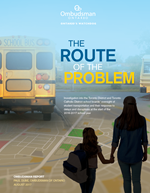 My investigation looked at 127 complaints, many from families who were hard hit by the busing disruption. For example, several young children with special needs went missing for hours after being dropped off at the wrong stops. A mother lost her job because her daughter’s school bus was repeatedly late and she couldn’t get to work on time.
My investigation looked at 127 complaints, many from families who were hard hit by the busing disruption. For example, several young children with special needs went missing for hours after being dropped off at the wrong stops. A mother lost her job because her daughter’s school bus was repeatedly late and she couldn’t get to work on time.
Our investigators reviewed emails and documents that revealed officials were aware of potential problems dating back to early 2016, after a new transportation service contract was signed and a new method was implemented for assigning routes. By August 2016, numerous routes had been repeatedly revised, leaving some operators and drivers unable or unwilling to cover them.
On September 1 – five days before the start of school – an email from the top transportation official warned both boards that “significant service delivery issues” should be expected, and one Catholic board official told a senior colleague: “You need to let everyone know.” Yet neither board sent formal written notification to parents until September 8 and 9.
In my report, I made 42 recommendations, all of which have been accepted by the boards and the consortium. In a letter, the boards’ transportation governance committee pledges to “ensure that the startup for this coming September is less disruptive and is well communicated.” Among other things, an online portal has been launched to keep parents informed about bus delays, and a professional call centre has been engaged to handle inquiries and complaints.
The boards will report back to my Office on their progress on other improvements – such as a planned “where’s my bus” app targeted for September 2018 – in response to my recommendations.
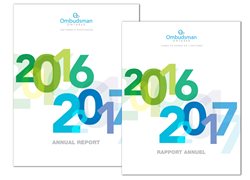 In other news this summer, you’ve likely already seen my Office’s 2016-2017 annual report, which was released on June 27. This was the first-ever annual report covering our new jurisdiction (which now includes municipalities, universities, and school boards). It provided detailed explanations about our office and our work, as well as about the 21,318 complaints we received last year. If you haven’t had a chance to read it, take a look at the 2016-2017 annual report.
In other news this summer, you’ve likely already seen my Office’s 2016-2017 annual report, which was released on June 27. This was the first-ever annual report covering our new jurisdiction (which now includes municipalities, universities, and school boards). It provided detailed explanations about our office and our work, as well as about the 21,318 complaints we received last year. If you haven’t had a chance to read it, take a look at the 2016-2017 annual report.
I was asked by a journalist why we think it’s important to publish an annual report. Well, other than the fact that it’s a legislative requirement under the Ombudsman Act, it’s a crucial tool for effecting positive change.
 Our Office is funded by taxpayers. As I said in a column in the Toronto Sun in July, our annual report not only educates and informs them of how we can be of assistance, it is also our accounting to the public about how we dedicate our resources and the outcomes we achieve.
Our Office is funded by taxpayers. As I said in a column in the Toronto Sun in July, our annual report not only educates and informs them of how we can be of assistance, it is also our accounting to the public about how we dedicate our resources and the outcomes we achieve.
Without our annual report, many problems we uncover would never see the light of day – and government organizations would be far less motivated to address them.
Once we get involved, we work proactively with an organization (often quietly, behind the scenes) to find solutions. If we can’t resolve the issue, we’ll investigate and use our credible and effective voice, and our moral suasion, to fix the problem. So our annual report is not simply a recounting of our year – it’s a tool for us to be transparent, to hold organizations to account, and to report on the good work we’ve done. It also encourages people to come to us with similar issues, such as a problem they didn’t realize we could fix. So please take a few minutes to read our annual report.
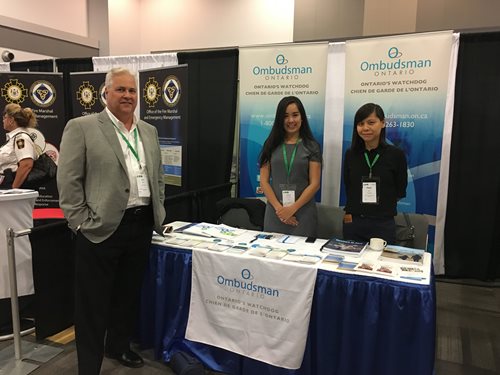
In the meantime, as summer draws to a close, we’ll be spending a few days at the Association of Municipalities of Ontario conference in Ottawa. We've also created new tip cards for municipalities, including for closing meetings and creating complaint processes, which we debuted at the AMO conference.
Then we'll start a busy fall of outreach engagements, speeches, presentations, and our annual investigative training course, Sharpening Your Teeth. Keep up with us on This link opens in a new tabTwitter, This link opens in a new tabFacebook, and This link opens in a new tabLinkedIn, and we’ll see you next time!
March 2017
(March 17, 2017) As the first anniversary of my appointment as Ombudsman approaches, I think it is an appropriate time to take stock of what the Office accomplished in the past year. It has been a year that saw not only the arrival of a new Ombudsman, but new areas of jurisdiction for our oversight of the Ontario public sector – effectively doubling our mandate to include municipalities, universities and school boards.
As many of you know, the first step I took as Ombudsman was to oversee the development of Value, Mission, and Vision statements which defined what we stand for as an organization and what we are striving to achieve. With this milestone achieved, we are now working to finalize three- and five-year plans.
In the twelve months since my appointment, we went on to complete three complex systemic investigations and issue the resulting reports. In Nowhere to Turn, we made 60 recommendations calling for better supports and services for adults with developmental disabilities. In A Matter of Life and Death, we pointed to the need for better police training to deal with people in crisis and made 22 recommendations to address the problems we found. All 82 of our recommendations have been accepted and we are following up on their implementation.
We also recently completed our investigation into non-competitive procurement practices at the City of Brampton. While our investigation revealed no wrongdoing or maladministration, in Procuring Progress we took the opportunity to propose some best practices that would optimize accountability and transparency in Brampton’s procurement processes. I was also pleased to see Mayor Linda Jeffrey tweet that she supports one of my principal suggestions to appoint an Auditor General to improve financial processes in the city. This is a recommendation we feel is relevant to municipalities across the province, and would encourage them to consider taking this step.
I support the This link opens in a new tab@Ont_Ombudsman recommendation for an independent Auditor General in This link opens in a new tab#Brampton. Read my release here: This link opens in a new tabhttps://t.co/CtGrqFpPbg
Linda Jeffrey (@LindaJeffrey) This link opens in a new tabMarch 6, 2017
In addition to our systemic reports, we made credible and authoritative submissions to the provincial government and its advisors, calling for an end to indefinite segregation in prisons and enhancements in police oversight that will give members of the public greater confidence in their safety and security.
And of course, we published our Annual Report in a new format which highlighted the great work our staff accomplished in all our areas of jurisdiction. We shared many of the compelling stories we dealt with over the course of the year and explained how we add value by helping get problems resolved as efficiently – and at the lowest level – as possible.
These accomplishments were realized despite the fact that we have still not reached our full staffing complement. The intensive work of recruiting and training new staff members is ongoing and continues to inject new energy into an already dynamic team. On another staffing note, it has also been a year since a new five-year collective agreement with unionized staff was ratified and implemented, just before I was sworn in.
Needless to say, our accomplishments over the past year have been the result of an incredible team effort. With the expansion to our oversight, and the need to grow our office, have come new challenges for everyone, from recruitment and training in new areas of jurisdiction, to building new relationships internally and externally. I am grateful for the energy and passion everyone in the office has devoted to the tasks at hand.
While we’re only halfway through the month, we’ve already been busy and have much more to come. We’ve planned many speaking engagements at which stakeholders want to hear updates on our recommendations as well as what we’re doing to improve the lives of Ontarians.
Earlier this month, many of our staff had the chance to take in a presentation from This link opens in a new tabthe Environmental Commissioner of Ontario, Dianne Saxe, about her recent report, This link opens in a new tabFacing Climate Change. It was a sobering wake-up call on the state of our environment and how our action - or inaction - affects the future of each and every person in Ontario. The state of our environment is an important issue and we thank Commissioner Saxe for taking the time to educate us. I am committed to doing what we can to help her educate Ontarians about environmental issues.
Ombudsman staff have been active in the recruitment community as well, attending university legal career days to attract the best and brightest as we look to continue growing our office. Over the past few weeks, our staff have taken part in career fairs at This link opens in a new tabQueen’s University, the This link opens in a new tabUniversity of Windsor, and the University of Ottawa, providing information about our office and about the kinds of creative and analytical minds we hope to hire. We’ll be at the University of Western Ontario’s Career Day on March 23, so please stop by and say hello.
Later this month, I’ll be sharing updates on the recommendations we made in Nowhere to Turn at a conference hosted by the This link opens in a new tabCentre for Addiction and Mental Health at the launch of a new service to help adults with developmental disabilities transition into the community. Our senior staff will also be speaking at This link opens in a new tabCUPE’s Social Service Workers Coordinating Committee conference on the same topic. These are significant opportunities to discuss our recommendations and our hope for improving supports in the developmental services sector, including the importance of breaking down barriers to support, and helping people access the care they need.
In early April, our staff will be at the This link opens in a new tabNational Business Improvement Area Association conference in Toronto, discussing the issues we’ve dealt with in municipalities and with local BIAs, and we have conferences and outreach engagements lined up right through to the end of the summer and beyond.
We need to continue to drive positive change and demonstrate our value to the people of Ontario. As an office that promotes accountability and administrative fairness, it is our duty to ensure we are achieving this in a constructive manner. We’ll continue developing and nurturing relationships with stakeholders, who are paramount to our success as an impartial oversight body. As I continue to hear from stakeholders across the public sector, collaboration is the best way to maximize progress. With the talented and energetic team we have, I am confident we will do just that.
To all those enjoying a well-deserved March Break, I wish you a safe and enjoyable time with your family and friends.
February 2017
(February 22, 2017) With the New Year well underway, we have hit a significant new milestone in our Office. We have now received more than 5,000 complaints related to our expanded oversight of municipalities, universities, and school boards. More than 90% of these cases have been closed.
The volume of complaints and the newness of these areas of jurisdiction underscore the need for continuous outreach and relationship building with stakeholders in order to get problems solved and influence positive change. In a typical month, representatives from our Office may be speaking to groups about policing, prisons, universities, school boards, municipalities, or any of the other 1,000 government or public sector bodies we oversee. February was no exception, as I was busy attending events with different stakeholder groups and building collaborative, productive relationships.
I was honoured to have been invited to speak at the This link opens in a new tabBadge of Life Canada conference “Surviving Trauma and Building Resilience in the Workplace” in Toronto, where I met several first responders and some of the health care professionals dedicated to providing them support in dealing with occupational stress injuries. The contacts I made and the conversations I had at this event provided me a greater insight into how police officers, firefighters, paramedics, correctional officers, and even border agents are exposed to trauma and suffer occupational stress injuries as a result. I was grateful for the opportunity to speak about our role in mental health and policing, and more specifically about two of our Office’s systemic investigations related to policing in Ontario. Our 2012 report In the Line of Duty looked at how the OPP and the Ministry of Community Safety and Correctional Services addressed operational stress injuries affecting police officers. One of our most recent reports, A Matter of Life and Death, released this past June, looked at the direction provided to police by the Ministry of Community Safety and Correctional Services for de-escalating conflict situations. In both reports, we made recommendations spurring government change to training and education programs to improve services for active and/or retired Ontario police officers.
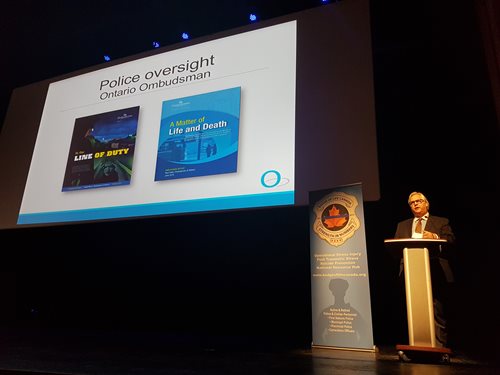
Earlier this month, I spoke to the This link opens in a new tabOntario Principals’ Council. This is an important stakeholder group in our new school board jurisdiction, and I was happy to provide attendees with an overview of the role and mandate of our Office and an update on complaint trends since our jurisdiction expanded to include school boards on September 1, 2015. There were excellent questions from participants about complaints related to special education, and about how we refer complainants to other oversight bodies, where appropriate. You can watch the video of my speech in full below. I also gave a presentation to the executive heads of the This link opens in a new tabCouncil of Ontario Universities, explaining that the Ontario Ombudsman is an office of last resort and that we encourage all universities to bolster or put in place their own ombudsman or other complaint resolution office.
Ombudsman staff also recently attended the This link opens in a new tabRural Ontario Municipal Association annual conference in Toronto, where staff spoke to hundreds of municipal delegates about everything from how we resolve most municipal complaints informally to the role of local integrity commissioners. General Counsel Laura Pettigrew gave two sessions to participants about the role of the Ontario Ombudsman in handling municipal complaints and the importance of local complaint processes and policies. Her presentation offered some useful tips for municipalities when creating or reinforcing complaint procedures.
I also recently sat down with the This link opens in a new tabIntegrity Commissioner J. David Wake and his staff for a lunch and learn. We had a great discussion about best practices for handling complaints efficiently and effectively and the types of issues our respective offices encounter on a regular basis.
Our first systemic investigation into a municipality has been completed and our findings on the non-competitive procurement practices of the City of Brampton will be submitted later this month. We also continue to make progress on our systemic investigation into segregation practices in the province of Ontario - stay tuned for updates on this file in the coming weeks.
Looking to the month ahead, Ombudsman staff will be visiting law schools across the province to attend career day events. We are always on the look out for new talent to join our team, and information about different career opportunities can be found on our website.
Since Christmas, I have been taking advantage of a planned - but nonetheless welcome - lull in my travel obligations to sit in on the meetings of our Office’s various teams and become familiar with more of the casework being done at the operational level, and the issues being dealt with early in the resolution and investigation processes. I continue to be truly impressed with the level of intelligence, collaboration and teamwork in our office. These meetings are conducted in a supportive and collegial manner and in a democratic fashion with everyone having the opportunity to share their knowledge and concerns. What comes through in these discussions is the passion of our staff for fairness, accountability, and transparency as well as a commitment to drive positive change. In all my professional life, I have never seen such an inspiring group of people coming together in such a positive way.
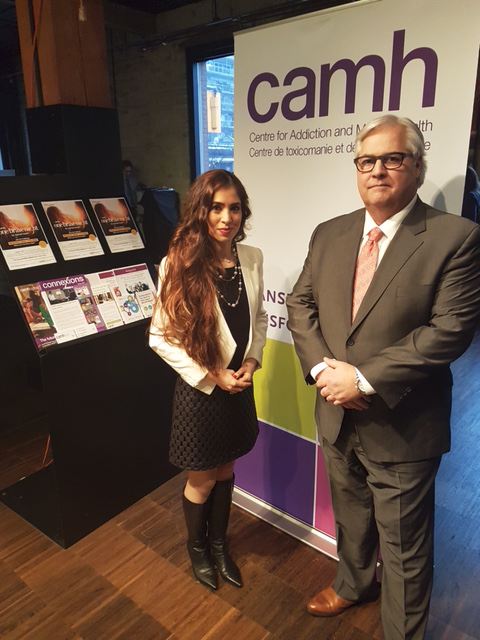 Ombudsman Paul Dubé with Dr. Katy Kamkar, Clinical Psychologist at the Centre for Addiction and Mental Health (CAMH) and Medical Advisor to Board of Directors at Badge of Life Canada (BOLC).
Ombudsman Paul Dubé with Dr. Katy Kamkar, Clinical Psychologist at the Centre for Addiction and Mental Health (CAMH) and Medical Advisor to Board of Directors at Badge of Life Canada (BOLC).
I will end this message with another observation. If there is one theme that I am seeing run through all of our jurisdictions, it is the prevalence of mental health issues and their impact on our society. From policing and corrections, to municipalities and provincial departments, to social services and education – we see families, educators, employers, and civil servants facing the challenges posed by serving and supporting our fellow citizens with mental illness. That point was underscored by Dr. Catherine Zahn, President and CEO of Toronto’s Centre for Addiction and Mental Health this month at an event hosted by the Empire Club. While there is more awareness and somewhat less stigma since we have moved from an institutional model to a community-based approach, people with mental illness and developmental disabilities still wage a constant battle for health care and their human rights. We must continue to work towards breaking down barriers and do more to help these people access care and support.
To stay up to date with our office, subscribe to our newsletter, follow us on This link opens in a new tabTwitter, like us on This link opens in a new tabFacebook, and check our website for regular updates.
January 2017
(January 23, 2017) As we head into 2017, I would like to wish everyone a happy New Year. I hope that this year brings you health and fulfillment in everything you do.
At the end of December, we posted a retrospective summary of our top 10 stories of the year, such as our two systemic reports, our annual report, and our expanded mandate. January 2017 also marks the one-year anniversary of our jurisdiction over municipalities and universities.
As busy and productive as the past year has been for our Office, we are looking forward to 2017 with much anticipation. This is the time of year when we set goals and establish priorities. Over the next few months, staff at our Office will continue with our regular external activities – such as outreach events, community and stakeholder fairs and conferences, and presentations to various groups – but our Office will also be focusing on internal projects.
To kick off the year, my team and I will be examining our Office’s efficiency with a view to improving our effectiveness. We’ll be reviewing many of our policies and procedures and updating them as necessary, as we continue to build appropriate and productive relationships with stakeholders. We will also look at ways to work more proactively with stakeholders in municipalities, universities and school boards, to develop best practice materials and continue to provide them with feedback on complaint trends and recurring issues.
We currently have three systemic investigations in progress. We launched our first formal municipal investigation, into the city of Brampton’s non-competitive procurement practices. Two other Special Ombudsman Response Team (S.O.R.T.) investigations are also underway – our first school board investigation, into the Toronto District School Board and Toronto Catholic District School Board’s busing issues, and an investigation into how the province of Ontario tracks and reviews the placement of inmates in solitary confinement. As our team brings these investigations to completion, we will continue assessing trends and prioritizing which issues to investigate next.
For our stakeholders and the public, we’ll be developing new and updated resources and communications products to support and complement our outreach and education initiatives, and better explain our processes and procedures. Explaining what we do and how we do it is a crucial element of our work with stakeholders. You can access our current resources – like brochures, posters, and videos – on our Resources page.
While the year is just getting started, I already have several meetings scheduled with various stakeholders and groups, including the public sector bodies we oversee. These meetings, along with the information resources and communications products we provide, help our office build and foster the relationships that enhance our effectiveness as an agent of positive change.
Later this month, members of our staff will be attending the 2017 Rural Ontario Municipal Association Annual Conference to speak about the importance of complaint policies for municipalities. We’ll also discuss best practices for creating local complaint processes, and how municipalities can work together with our Office and with other accountability officers. I am pleased to see the co-operation we are receiving from so many municipalities that understand the value we can add to their efforts to optimize transparency and accountability.
I also have the opportunity to make several presentations in early February. I’ll be speaking at the This link opens in a new tabBadge of Life Canada conference about our office’s role in spurring government change to help Ontario police officers in dealing with PTSD, and our recommendations to provide police with better de-escalation training for crisis situations. That same week, I’ll be presenting to the Ontario Principals’ Council at its annual general meeting, and then to the Council of Ontario Universities. The aim of these talks is to share how we work with these stakeholder groups to resolve issues.
I am also looking forward to continued, productive partnerships with ombudsman offices from across the country and around the world – especially those with expanding jurisdictions – as we develop standards and collaborate on best practices.
Of course, a key component to our plans for the upcoming year is the continued expansion of our team with the recruitment of passionate and talented individuals who will enable us to tackle more issues and solve more problems for the people of Ontario. Take a look at this video – it shows some of the work we do. If our work sounds like something that would interest you, consult our current postings for career opportunities with our office.
Finally, I saw an excellent example earlier this month of the value for organizations in embracing complaints as a valuable source of feedback. In an exemplary response to a service complaint, Tesla and SpaceX CEO Elon Musk acknowledged the complaint, admitted the problem, and took action to resolve the problem immediately. Mr. Musk had received a complaint from a Tesla owner on Twitter that some Tesla car owners were leaving their already-charged electric vehicles in the specialized charging docks for several hours, denying other Tesla owners access to the chargers. Seeing an opportunity, Mr. Musk responded to the man on Twitter and just six days later, Tesla introduced a fleet-wide update that would charge users an idle fee for unnecessarily occupying a charger. You can This link opens in a new tabread the entire article.
What Elon Musk has shown us, and what our office believes as well, is that complaints drive positive change. As Bill Gates once said, “Your most unhappy customers are your greatest source of learning.” Customer complaints are an organization's best source of feedback and information upon which to correct problems and build improvements. They should be embraced.
There are many ways to stay informed about the goings-on at our office. Subscribe to our newsletter, follow us on This link opens in a new tabTwitter, like us on This link opens in a new tabFacebook, and check our website for regular updates.
December 2016
(December 22, 2016) December is upon us, and with that, the end of 2016. I can hardly believe that it has been nine months since I took office in April – time really does fly when you are busy and loving what you do.
I see every day how busy everyone else in the office is as well. The dedication of management and staff to our Mission and Vision – and the passion with which everyone devotes themselves – is profoundly impressive and heartening. I am extremely proud of the team that we have and the work that we do.
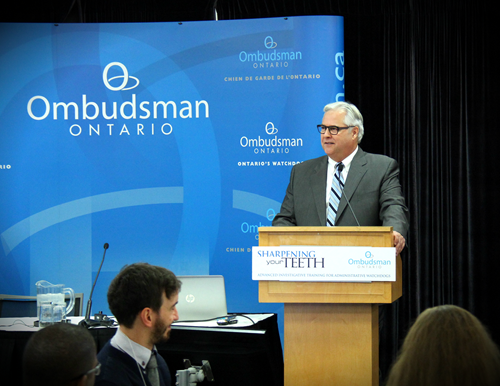
We definitely could not have received and resolved thousands of complaints and requests for assistance, published two reports on significant systemic investigations and have all 82 recommendations accepted, produced two well-received submissions on segregation and police oversight, issued our Annual Report, conducted dozens of outreach events, launched new systemic investigations, held hundreds of meetings with stakeholders (all while recruiting and training the new talent we require to enhance our capacity to affect positive change) without tremendous efforts from everyone.
With the historic expansion of our mandate to municipalities, universities and school boards now in full effect, we’ve greatly increased our outreach activities to continue building meaningful, productive relationships with stakeholders. Many of us have been travelling frequently to engage and inform stakeholders and share the work that we’ve been undertaking. Wherever I go, I am constantly reminded of the strong reputation that the Office of the Ontario Ombudsman has within Ontario, across Canada, and throughout the international watchdog community.
For example, at last month’s This link opens in a new tab11th World Conference of the International Ombudsman Institute (IOI) in Bangkok, where I was invited to speak about our new jurisdiction, I had the chance to meet with fellow ombudsmen from Africa, Europe, Asia and the Caribbean to discuss issues surrounding multiple and expanding jurisdictions of ombudsman as well as share best practices. In the elections for a new IOI Board of Directors, I was honoured to be acclaimed as the new regional president for North America. I was also invited to meet with Japan’s ombudsman, known there as the Administrative Evaluation Bureau, in Tokyo, and to discuss best practices and common challenges we face in the oversight world.
Here at home, our office welcomed representatives from the parliament and national ombudsman of Georgia, with whom we discussed our role as a provincial oversight body and how we work to achieve positive change for stakeholders.
I announced earlier this month that we have launched a formal investigation into segregation and solitary confinement processes in Ontario jails. This comes after our submission to the Ministry of Community Safety and Correctional Services in May calling for the abolishment of indefinite segregation. We have a couple of systemic investigations near completion and have several other important issues in the hopper for consideration.
I was pleased to have the opportunity to speak recently with the Deputy Ministers’ Council - the top managers of every provincial ministry – about how our work in investigating and resolving public complaints helps improve governance. As I noted in the presentation: “It’s essential that we build trust and credibility with all stakeholders. If stakeholders on all sides understand that the Ombudsman will act fairly, we can come up with the most effective solutions to administrative problems.” Outreach and relationship building is essential to our work and will continue to be a priority for our office.
Among our many outreach events this month were the This link opens in a new tabOntario West Municipal Conference, where members of our staff addressed attendees and also had a booth to engage with stakeholders, the Annual General meeting of the This link opens in a new tabOntario Municipal Management Institute, and a committee of the This link opens in a new tabOntario Association of School Business Officials.
Outreach and speaking engagements afford valuable opportunities to explain our processes and findings, but also to hear from stakeholders and get input and information from them firsthand. For example, on Dec. 8, I was the keynote speaker at a human rights forum organized by the Ottawa Police, where I discussed our report, "A Matter of Life and Death", and our recommendations to improve police training for de-escalating conflict situations. We had plenty of great feedback and engagement from attendees ranging from police officers, to human rights advocates, to local politicians and students. And last week, I was invited to visit the Ontario Police College (OPC) and meet with the director and management team. This was an opportunity to observe de-escalation training firsthand and learn about how our recommendations have already led to changes in the OPC program. I also discussed police oversight issues with This link opens in a new tabOntario’s Independent Police Review Director, Gerry McNeilly, at a meeting in Toronto.
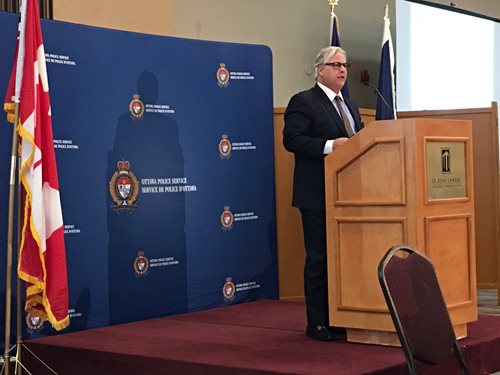
In the spirit of the holiday season, our annual staff potluck lunch raised $800 for the United Way – congratulations to all involved on a successful and enjoyable event. To all readers of this message, I wish you and your families a safe and happy holiday, and a healthy and satisfying 2017. I look forward to sharing more with you in this space in the coming months.
November 2016
(November 21, 2016) November has been an exciting month at our Office, with the release of our 2015-2016 Annual Report on November 2—our first annual report since our mandate expanded to include municipalities, universities, and school boards. If you missed the release, you can watch the video of the press conference on our website or read the full report.
Our Annual Report reviews the work of our Office over the last year – including dealing with more than 22,000 complaints - and provides updates on recent and ongoing systemic investigations. The report also outlines our role, mission and processes, and, for the first time, categorizes significant cases and trends by topic. We’ve also highlighted individual cases that our team was able to help resolve.
Our investigation into busing problems that both the Toronto District School Board and Toronto Catholic District School Board have been experiencing is progressing. Since the beginning of the school year, we have received more than 100 complaints relating to busing, and more than 1,000 complaints about school boards in total since September 1, 2015. As with all of our Special Ombudsman Response Team (SORT) investigations, we will be examining the matter in-depth, gathering evidence, interviewing witnesses and reviewing documents. Read more about our investigation process.
Our team has attended several meetings and outreach events in the past few weeks. In early November, Deputy Ombudsman Barbara Finlay welcomed the This link opens in a new tabOhio Legislative Fellows to our office and explained the role and function of the Ontario Ombudsman.
We’ve also had opportunities to share the findings of our most recent systemic investigation, "Nowhere to Turn", about the Ministry of Community and Social Services’ response to situations of crisis involving adults with developmental disabilities. General Counsel Laura Pettigrew and SORT Investigator William Cutbush spoke at the This link opens in a new tabCUPE Developmental Services leadership meeting in late October and Mr. Cutbush also met with This link opens in a new tabOpportunities Mississauga for 21 Plus.
And just this past weekend, Ombudsman staff spoke at the This link opens in a new tabPeople for Education Annual Conference on the first year of our oversight of school boards.
I was honoured to have been invited to participate in the This link opens in a new tab11th World Conference of the International Ombudsman Institute, where I spoke about the recent expansion of our Office’s jurisdiction and shared our tips and best practices for planning and executing the expansion of an Ombudsman’s jurisdiction. It was a pleasure to connect with colleagues from around the world and share our knowledge and expertise in this area.
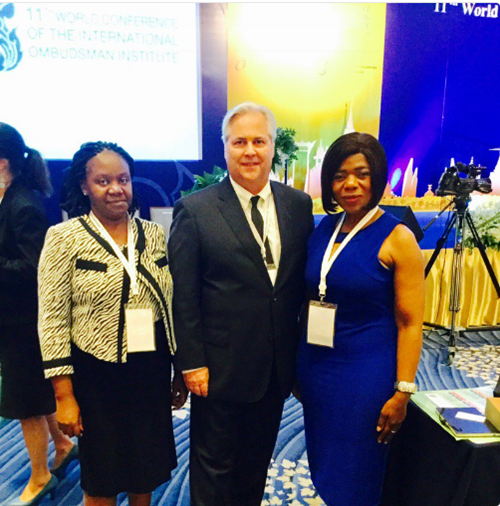
Here at home, I gave a presentation to the This link opens in a new tabForum of Canadian Ombudsman’s Corrections Course in Ottawa on November 7 on our recommendations for improving segregation practices in the province of Ontario, including our recommendation to abolish indefinite segregation. You can read our submission to the Ministry of Community Safety and Correctional Services, entitled "Segregation: Not an Isolated Problem".
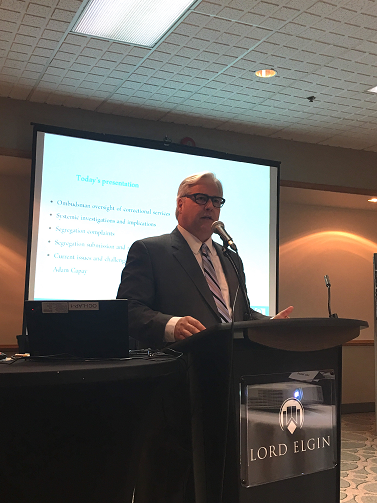
Though the holiday season is fast approaching, things are by no means slowing down at our Office. We have several outreach events planned in the upcoming weeks, including the This link opens in a new tabOntario West Municipal Conference in London, the This link opens in a new tabOntario Municipal Management Institute conference in Toronto, and meetings with various stakeholder groups around the province.
There are many ways to stay informed about the goings-on at our office. Subscribe to our newsletter, follow us on This link opens in a new tabTwitter, like us on This link opens in a new tabFacebook, and check our website for regular updates.
October 2016
(October 28, 2016) A lot is happening at our Office these days as we continue to be busy and productive. Following the release of two important systemic reports in June and August (all of our 82 recommendations were accepted), we are now preparing for the release of our Annual Report on November 2. You will be able to catch the live webcast on the main page of our website at 2 p.m. – so mark your calendar!
Yesterday, I also made public my submission to the Independent Police Oversight Review, led by the Hon. Michael Tulloch, as well as attended the public Ottawa consultation on October 26. As I noted in my submission, “Our civilian oversight bodies represent critical checks and balances in our democracy, and public trust depends on their effectiveness.” I made 16 recommendations, including calling for all three of Ontario’s police oversight bodies – the Special Investigations Unit, the Office of the Independent Police Review Director, and the Ontario Civilian Police Commission – to be included in my mandate, as well as municipal police services boards. At present, the only one of these bodies within my jurisdiction is the SIU, which investigates cases where police are involved in incidents of serious injury or death. To leanr more, read the submission.
We were also pleased to hold our sold-out annual investigative training course, “Sharpening Your Teeth” in Toronto earlier this week. This course is targeted to investigators, ombudsmen and other professional watchdogs, with a focus on advanced investigative techniques. We were honoured and excited to have participants come from as far as Tonga, Ukraine, Antigua and Barbuda, and Nebraska, as well as from across Canada. We were also delighted to have two special guest speakers again this year – New Brunswick Ombudsman Charles Murray, who discussed the challenges and value of independent oversight, and Premier Kathleen Wynne, who emphasized the importance of open government.
On September 26, I announced a systemic investigation into ongoing busing problems that both the Toronto District School Board and Toronto Catholic District School Board have been experiencing. I spoke with This link opens in a new tabGlobal News’ Focus Ontario about the matter. Since the beginning of the school year, we have received more than 50 complaints relating to busing, and 970 complaints about school boards in total since September 1, 2015.
As with all of our Special Ombudsman Response Team (SORT) investigations, we will be examining the matter in-depth, gathering evidence, interviewing witnesses and reviewing documents. You can read more about our investigation process.
Our team has attended several municipal events in the past few weeks. I was invited to speak to 40 member municipalities at the This link opens in a new tabFrancophone Association of Municipalities of Ontario’s annual conference in Hearst on September 22. Our staff also spoke at the This link opens in a new tabRural Mayors’ Forum of Eastern Ontario in McNab, Ontario and we’ll be meeting with the Municipal Integrity Commissioners of Ontario at the end of the month. Deputy Ombudsman Barbara Finlay met with representatives from 23 municipalities in the Parry Sound area on September 30, and General Counsel Laura Pettigrew presented at the Association of Municipal Managers, Clerks and Treasurers of Ontario’s Municipal Information, Access and Privacy Forum on October 14.
Ms. Pettigrew also spoke to the This link opens in a new tabARCH Disability Law Centre and This link opens in a new tabPeople First about our recent report on services for adults with developmental disabilities who are in crisis, "Nowhere to Turn". They were happy to hear more about the report and recommendations and we encouraged them to reach out to us with any additional complaints.
I have recently had opportunities to share expertise with colleagues in the oversight field, as well. I visited Albuquerque, New Mexico, where I made a presentation to police oversight officials from across North America at the This link opens in a new tabNational Association for Civilian Oversight of Law Enforcement’s Annual Conference about the report on police de-escalation techniques, which was very well received. I also discussed de-escalation with civilian heads of oversight of law enforcement in Ottawa during a meeting organized by the This link opens in a new tabCivilian Review and Complaints Commission for the RCMP. And, I attended the This link opens in a new tabUnited States Ombudsman Association annual conference in Arlington, Virginia, in mid-October - a valuable opportunity to share knowledge and expertise with ombudsmen from across North America.
Here at home, I met with my fellow Officers of the Legislature at the new offices of my colleague François Boileau, the French Language Services Commissioner. It was an excellent opportunity to discuss best practices and how we serve Ontarians. And I met with the City of Toronto’s accountability officers - the Ombudsman, Auditor General, Lobbyist Registrar and Integrity Commissioner - and discussed some of our common challenges.
And finally, it was my pleasure to join our Office’s Run for the Cure team, the Ombudsman Watchdogs on October 2 – the team’s ninth year participating in the Canadian Breast Cancer Foundation’s fundraising event.

There are many ways to stay informed about the goings-on at our office. Subscribe to our newsletter, follow us on This link opens in a new tabTwitter, like us on This link opens in a new tabFacebook, and check our website for regular updates.
September 2016
(September 15, 2016) With the start of the new school year, school board issues are top of mind in our office.

Our office recently marked the one-year anniversary of our oversight of the province’s 82 school boards, which came into effect on September 1, 2015. We received more than 700 complaints about school boards in the first year of our expanded mandate, most of which were resolved through early resolution or referral. Topics ranged from special education, to bullying, to busing, to school staff. We have not yet launched a single formal investigation into a school board issue.
Last week, we also announced that our office is assessing problems with the busing of students in the Toronto District School Board and the Toronto Catholic District School Board to determine whether or not a systemic investigation is warranted. This comes after media reports and complaints from parents who experienced significant delays waiting for their children to be picked up or dropped off, or had no bus show up at all. Our staff will look into what happened, what plans the school boards had in place, and what was done to inform parents prior to deciding if we want to conduct a formal investigation.
Our latest report, "Nowhere to Turn", was released on August 24th. The report covers our investigation of more than 1,400 complaints from families of adults with developmental disabilities who are in crisis situations, including being abandoned, abused, unnecessarily hospitalized and jailed. In "Nowhere to Turn", I made 60 recommendations highlighting an urgent need for greater supports, services, and more rigorous monitoring, all of which were accepted by the Minister of Community and Social Services. You can watch my press conference and the Minister’s response on our website. The Minister has agreed to report back to my Office at six-month intervals.

Our report highlighted 18 individual cases that were especially egregious. One woman was moved more than 20 times in 34 days because there were no residential placements available. Another man spent 12 years in a psychiatric hospital before a placement was created for him.
Since the report was released, the Ministry of Community and Social Services has This link opens in a new tabimplified the application process for young people with developmental disabilities and their families applying for the Ontario Disability Support Program (ODSP) and Special Services at Home (SSAH) funding.
We continue to publish regular reports on closed municipal meetings. All Ontario municipal councils, boards and committees are required by law to hold open meetings, with a few exceptions, and the public can complain to our Office or another appointed investigator if they feel a meeting has been improperly closed. Our Open Meeting Law Enforcement Team (OMLET) investigates such complaints in all municipalities except those that have appointed their own closed meeting investigators.
In the Township of Woolwich, OMLET found no evidence that a closed meeting on an upcoming delegation had a quorum of the committee behind closed doors, or laid the groundwork for a decision on the delegation.
We investigated two complaints about the Township of Leeds and the Thousand Islands. We found that council violated the opening meeting requirements of the Municipal Act when it discussed a zoning by-law application over email, and recommended that council cease its practice of discussing council business using emails or any other electronic format. As I noted in my report, this is the third time our Office has cautioned the township that they shouldn’t hold meetings over email. While I understand council’s desire to be open and transparent in its public communications and to embrace modern technology, council must do so within the current legislated requirements of the Municipal Act.
In another case in the same township, we found an April 18, 2016 meeting to discuss reassignment of the Chief Administrative Officer’s duties fit within the exception for personal matters about an identifiable individual, but advised that council’s resolution to proceed in camera should provide more information about the subjects to be discussed in closed session.
My staff and I have also attended outreach events like the This link opens in a new tabOntario Municipal Tax and Revenue Association’s fall conference in Minett and the This link opens in a new tabOntario East Municipal Conference in Kingston. As always, it is a pleasure to meet with municipal stakeholders from across the province and answer questions about our expanded oversight of municipalities. I also hosted the This link opens in a new tabOntario Legislature Internship Programme interns at our office and explained our mandate and oversight role.

Of course, to continue our work on provincial oversight and fulfill our new mandates with respect to municipalities, school boards, and universities, we need to grow our team. We are committed to maintaining the standards of excellence for which we are recognized and are continuing to recruit exceptional new team members. As a sign of gratitude for the great work being done across the office, the Executive Management Team recently picked up the tab for a social evening for staff, which was well attended and enjoyed by all.

Looking ahead to the coming months, we’ll be releasing our 2015-2016 Annual Report, and hosting our annual advanced investigative training, Sharpening Your Teeth, in late October.
My staff and I will continue to attend various outreach events across the province, including attending both the Association française des municipalités de l'Ontario in Hearst and the This link opens in a new tabMunicipal Finance Officer’s Association of Ontario conference in Niagara Falls next week.
There are many ways to stay informed about the goings-on at our office. Subscribe to our newsletter, follow us on This link opens in a new tabTwitter, like us on This link opens in a new tabFacebook, and check our website for regular updates.
Enjoy the start of the fall season!
August 2016
(August 17, 2016) The upcoming school year brings with it an important milestone: September 1 marks one year since our office first began taking complaints about school boards.
And it’s been a busy year. Under our new mandate, we’ve helped resolve issues about school bullying, suspensions and expulsions, special education, safety and security, and bussing, among many other things – more than 700 complaints since September 1, 2015. The majority of those complaints were resolved through early resolution or referral.
In one situation, we intervened when things reached a standstill between the mother of a boy on the autism spectrum and his school board. The boy refused to return to school after an incident when police were called. The mother suggested home schooling, but the board insisted the boy stay in school. We helped the school board work with the mother to develop a home schooling plan.
We share case resolutions from our various areas of jurisdiction every month in our newsletter – sign up for The Watchdog newsletter. We’ll also be providing an update on our oversight of school boards (as well as of municipalities and universities, which began in January 2016) in our Annual Report, to be published this fall.
As I noted last month, we’re releasing a much-anticipated report in late August. The report on our investigation into the province’s services for adults with developmental disabilities in crisis will be released on August 24, 2016. We’ve had more than 1,400 complaints about this issue, and our staff have resolved scores of these urgent individual cases, while reviewing and assessing numerous significant changes in government policy, funding and services in this area. You can watch the press conference live on our website at 11 a.m. on August 24.
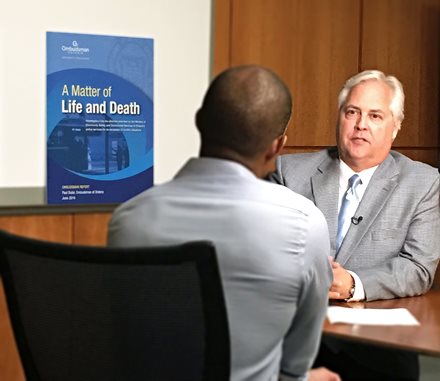
Our recently released report, "A Matter of Life and Death", recommended government overhaul the police training program to ensure police are better trained on de-escalation techniques. The government committed to implementing my 22 recommendations on the day the report was released in late June. However, since then, a tragic case has unfolded in Ottawa – the case of Adbirahman Abdi, who died after being arrested by Ottawa police. This event, and others like it, underscore the need for significant reform in police training. The use of force model needs to be rethought, and police need more non-lethal options for dealing with people in crisis. I spoke to several media outlets about my call for improved training. Watch and read CBC’s The National, This link opens in a new tabGlobal News, This link opens in a new tabCBC Ottawa, and the This link opens in a new tabGlobe and Mail.
We continue to publish regular reports on closed municipal meetings. Our Open Meeting Law Enforcement Team (OMLET) investigates such complaints in all municipalities except those that have appointed their own investigators.
OMLET determined a March 7, 2016 meeting of the City of Brockville's OPP Contact Adhoc Committee to discuss the OPP costing process fit within the "education and training" exception to the Municipal Act's open meeting requirements, but a vote to direct staff to approach an audit firm to assess the proposal violated the Act because it advanced committee business.
In Hamilton, we found a closed meeting by the city's Election Compliance Audit Committee on July 15, 2015 was illegal, because the committee falls within the Municipal Act’s definition of a “local board” and is subject to the Act’s open meeting requirements. Notice of the meeting was not provided, no procedure was followed to close the meeting to the public, and the topic of discussion did not fall within any of the Act’s exceptions to the open meeting rules.
We found that Oshawa city council violated the Municipal Act when it met in camera with the Oshawa Power and Utilities Corporation to obtain information about a proposed merger of utility companies. Noting that the meeting did not fall within the “education and training” exception, or any exception, to the Act’s open meeting requirements, I made recommendations to improve the city's open meeting practices.
Finally, we received a complaint that the board of directors for the Walkerton Business Improvement Area discussed matters that did not fall within the exceptions in the Municipal Act, 2001 during a meeting on June 8, 2016. We found that the discussion fit within the exception for litigation or potential litigationand the meeting was closed properly.

My staff and I have also been busy attending outreach events – like the Canadian Bar Association conference in Ottawa and at the Association of Municipalities of Ontario conference in Windsor in mid-August. Our Office had a booth at both events, and our staff met with and answered questions from dozens of attendees. As I noted on Twitter, the AMO conference was especially productive and engaging. It was a pleasure to meet many municipal stakeholders, and I plan to attend the annual conference in the future to stay informed of issues faced by municipalities.
Next, I’ll be in Ottawa on August 18 to speak to the Ontario Secondary School Teachers Federation (watch our website for my speech!), as well as meet with stakeholders.
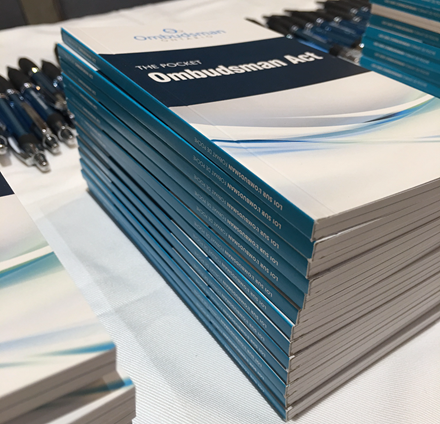
We’re ramping up for a busy fall. Our 2015-2016 Annual Report is in progress, and we’ll be at various outreach events across the province (including at the This link opens in a new tabOntario East Municipal Conference in Kingston and the This link opens in a new tabAssociation française des municipalités de l'Ontario in Hearst). Come say hi and grab an Ombudsman pen, a pin or a pocket Ombudsman Act if you’re in the area!
Enjoy the rest of your summer!
July 2016
(July 21, 2016) Despite the heat of July in Toronto, things haven’t slowed down at the Ombudsman’s Office.
On June 29, we released our report “A Matter of Life and Death”, an investigation into the direction the province provides to police for de-escalating conflict situations. I made 22 recommendations calling on the Ministry of Community Safety and Correctional Services to save lives by requiring police across the province to use de-escalation techniques in conflict situations before resorting to lethal force – all of which were immediately accepted.
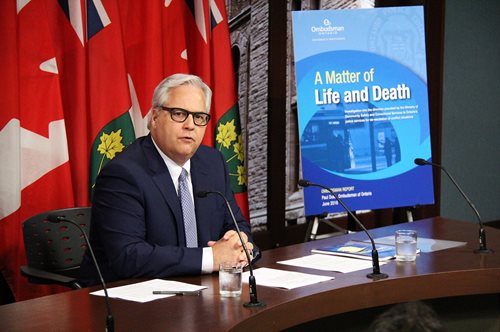
This investigation was launched in the wake of the streetcar shooting death of Sammy Yatim by a police officer in Toronto in 2013. Since then, my Special Ombudsman Response Team received 176 complaints and submissions, conducted 95 interviews and reviewed thousands of pages of documentation to put together this comprehensive report.
What we found was shocking, but hardly surprising. We learned about crisis after crisis, tragedy after tragedy; innocent people armed with scissors, small hammers, or even table legs, who were shot and killed by police. Just during the course of our investigation, 19 more people were shot dead by police. In many cases, these were vulnerable people in crisis.
We have expressed very clearly that this report is not critical of police in Ontario. It is, however, critical of the inadequate training they receive on how to de-escalate conflict situations involving people in crisis. The report recognizes that front-line police officers regularly have to deal with such difficult and potentially dangerous situations. The point of the report is that they need better de-escalation skills and more non-lethal tactics to draw upon to reduce the likelihood of a deadly outcome.
As I said in my report, “Ontario officers have plenty of training on how to use their guns, but not enough on how to use their mouths.”
In the report, I recommended updating the legislation, guidelines and model for training police in the use of force, bolstering de-escalation training at all levels, and ensuring consistent and updated training across the province. I gave the Ministry of Community Safety and Correctional Services a timeline – one year – to implement my 22 urgent recommendations.
After my press conference on June 29, This link opens in a new tabthe Minister immediately announced he had accepted all of my recommendations and my one-year timeline. I was encouraged to see this commitment to improving police training and will be monitoring the Ministry’s progress over the next year. This is truly a matter of life and death.
We have another systemic investigation report nearing completion – the report about our investigation into services for adults with developmental disabilities in crisis. I sent my findings to the Ministry of Community and Social Services on May 24. The report is in its final stages and we plan to release it on August 24. (You'll be able to watch it live on our website at 11 a.m.) In this case, changes to government policies and programs during the course of the investigation required our investigators to review and assess their impact on the issues at hand. We updated our findings to reflect these developments, and pursued dialogue and consultation with the Ministry to give it a chance to respond to our updated findings and conclusions.
Earlier this month, I attended the annual meeting of the Canadian Council of Parliamentary Ombudsman, this year hosted in Whitehorse by the Yukon Ombudsman and Information and Privacy Commissioner, Diane McLeod-McKay. It was an important opportunity to meet with my fellow provincial and territorial ombudsmen and discuss common issues and challenges. These meetings are an excellent way to share best practices, learn from the experience and work of other Ombuds, and promote consistency in our approaches. It was also valuable to consult with my colleagues about oversight of the broader public sector – namely, municipalities, universities, and school boards. Several provincial ombuds already have oversight of municipalities, although it is a new role for my Office and for my colleague in Saskatchewan, and it may be introduced as part of the Alberta Ombudsman’s jurisdiction in the coming months.
Also this month, Canada's Public Policy Forum This link opens in a new tabreleased its final report on its work with our office in consulting with stakeholders for the historic expansion of our mandate to municipalities, universities and school boards. The Forum hosted roundtables for representatives of these sectors across the province, as well as a one-day conference in Toronto this past February. These meetings provided us with valuable feedback and an opportunity to address stakeholders' concerns about what to expect and how we work. We have already implemented many of their suggestions (like webinars and videos) in response.
I was also honoured to be featured in the Law Times recently. As many of you know, I’m a lawyer by trade and read the Law Times regularly.
We continue to share stories about our individual case resolutions, OMLET reports, and outreach activities in our monthly newsletter. Join more than 7,500 other people who receive it at the end of every month. And don’t forget to follow us on This link opens in a new tabTwitter, like us on This link opens in a new tabFacebook, join us on LinkedIn to watch for job postings, and check out our This link opens in a new tabYouTube channel for all the latest. (For those of you who are new to our social media channels, we’ve developed some information about how we use these accounts and what you can expect.)
I hope you all continue to enjoy this beautiful summer!
June 2016
(June 14, 2016) It has been an eventful 10 weeks since I became Ombudsman on April 1. In just the past month since my last message, we have moved two major provincial investigations to their final stages, reported on three closed meeting investigations and announced our first systemic investigation involving a municipality. We also resolved hundreds of complaints in our new areas of jurisdiction – municipalities, universities and school boards – and continued our efforts to expand our team to handle our expanding caseload (more than 2,000 complaints received in recent months).
As both our team and our jurisdiction grow, I felt it was important to establish a roadmap for the next five years – not only to guide our work, but to give complainants and stakeholders a clear picture of how we work and what they can expect from us.
Communicating with stakeholders and fostering an understanding of our role and processes is more important than ever as we expand our Office and execute our mandates. I meet almost every week with special interest groups requesting that we undertake a systemic investigation into an issue of importance to them, as well as with heads of public bodies that hope that we don’t. As we cannot fulfill every request for a systemic investigation, we must be guided by a clear and appropriate set of values and guiding principles when deciding how and where to direct our resources.
To that end, in early May, we developed Values, Mission and Vision statements that articulate our fundamental principles and our aspirations for our Office. You’ll hear more about these important guiding principles in the coming months and years, as they focus and inform our work to improve government and broader public sector services. We have shared them on our website and will incorporate them into future communications – ensuring everyone knows what we stand for and how we operate.
As I noted last month, we have moved forward on our two pending systemic cases:
- Our investigation into the direction provided by the province to police services in de-escalating conflict situations; and
- our investigation into services for adults with developmental disabilities who are in crisis. Our findings in both cases have been provided to the relevant ministries for their input – as required under the Ombudsman Act – and I plan to release the final reports in late June and July, respectively.
We also announced our first systemic investigation related to our new municipal jurisdiction – into the City of Brampton’s procurement practices. Our Special Ombudsman Response Team is gathering evidence now and will determine timelines for the investigation once they assess the first phase. In other municipal news, I signed off on investigations by our Open Meeting Law Enforcement Team into complaints about closed meetings in Sudbury, Norfolk County and Midland. In the first, we found no issues, but the two others were found to have violated the Municipal Act, and we recommended best practices to help both municipalities improve in future.
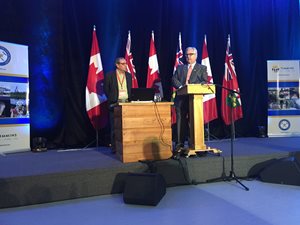
Meanwhile, I had the honour of speaking to a variety of stakeholder groups, including the Federation of Northern Ontario Municipalities in Timmins on May 12, and the Ontario College of Teachers in Toronto on June 2. At both events, I discussed the importance of independent oversight and robust accountability processes at the local level. My colleagues have kept up our active outreach campaign as well, presenting at events around the province, including the Ontario Municipal Administrators’ Association conference in Alliston; the Ontario Association of School Business Officials in Windsor; a Q&A session with the University of Windsor’s student ombudsman; the Halton District Catholic School Board Council of Chairs; the Municipal Law Departments of Ontario meeting in Markham; the French edition of the Federation of Canadian Ombudsman’s Ombudsman Essentials course in Quebec; and the Association of Municipal Managers, Clerks and Treasurers (AMCTO) annual conference in Niagara Falls, as well as at various AMCTO zone meetings and workshops.
In between these events, I attended the Council of Canadian Administrative Tribunals’ annual symposium in Ottawa at the end of May – an excellent opportunity to share expertise and learn from authorities on administrative justice from across Canada and around the world. As my Office oversees many administrative tribunals, I found the conference’s speakers on such themes as access to justice and procedural fairness to be informative and even inspirational.
The summer ahead promises to be busy, as we release our next two reports, attend such major events as the Association of Municipalities of Ontario annual conference in Windsor in August, and plan for our Annual Report release this fall. We are also planning our next Sharpening Your Teeth training course for ombudsmen and administrative investigators, set for October 24-26 – registration is now open. Keep in touch and we will continue to keep you posted – in our e-newsletter, on social media, and in this space.
May 2016
(May 11, 2016) It is an honour to serve as Ontario's seventh Ombudsman. But an ombudsman cannot do this work alone and this is far from a one-person operation. It takes a large organization of dedicated people, passionate about promoting fairness, transparency and accountability in the public sector.
It also takes a dedicated group of people with special skills to be able to effect positive change for the people of Ontario. I’m extremely privileged to have joined such an organization on April 1. The first month of my term has been a busy and productive one for the entire office.
This message is my way of keeping you informed about what we’re up to – it’s something I did regularly in my previous position as federal Taxpayers’ Ombudsman and you can expect regular postings from me.
 Ontario Ombudsman, Paul Dubé, in his first meeting with staff.
Ontario Ombudsman, Paul Dubé, in his first meeting with staff.
Since January, the Ombudsman’s Office has been undergoing the most significant expansion in its 40-year history. Our Human Resources team and all directors and managers have been working flat out on the recruitment of the very specialized talent we require for the work involved in our new areas of responsibility - municipalities, universities and school boards. So far, we have staffed 17 of the 57 new positions created to handle these new jurisdictions.
In our new jurisdiction, we have received 1,255 complaints about municipalities (since January 1); 445 about school boards (since September 1); and 85 about universities (since January 1) – all while working to staff the positions we require to handle these complaints. As one observer noted, “it’s a bit like trying to change a tire on a bus that’s moving at high speed.” Nevertheless, we have been successful in attracting and hiring many talented people with an impressive combination of intelligence and experience, and we will continue to do so.
In other good HR news, our directors negotiated a new five-year collective agreement with the Canadian Office and Professional Employees union local 343, which represents our unionized staff. This contract – ratified at the end of March, just before I took office – helps ensure a stable workforce for the important work we have to do. We were also pleased to open new office space in early April – in the same building as our headquarters, 483 Bay Street – for our expanding team. We’ve optimized everything for maximum flexibility, from the technology to the furniture. Our Information Technology team has worked hard to create an environment where employees can work and move seamlessly between the two spaces.
In addition, I signed off on two reports on investigations of closed municipal meetings, conducted by our Open Meeting Law Enforcement Team (OMLET), relating to council meetings in the Township of Russell and the Municipality of The Nation. Both found instances that contravened the Municipal Act.
Our Early Resolution team continues to demonstrate its effectiveness in getting problems solved for Ontarians quickly and at the lowest level possible and our Investigations team has resolved and investigated a wide range of complaints. For example, they helped a homeless student get approved for welfare, and they helped a man who owed no family support clear up a mistake by the Family Responsibility Office that had resulted in an unjustified writ against his property.
Addressing systemic issues is a key function of an ombudsman and it will always be a priority of mine. In my seven years as Taxpayers’ Ombudsman, I published eight special reports and an observation paper on systemic issues. As rewarding as it is to resolve individual complaints, if we looked at them in isolation we would miss the opportunity to address the root causes and prevent them from recurring. We seek to address systemic issues whenever possible, with a view to preventing future complaints.
Our Special Ombudsman Response Team (SORT) is working hard on assessments for potential new investigations and updates on others in progress. We will report on our two pending investigations as soon as possible. It is not uncommon for the entities being investigated to review their policies and procedures and implement changes during the course of an investigation. For our reports to be accurate and our recommendations to be feasible and appropriate, we often need to step back and monitor the impact of those changes before finalizing our observations, conclusions, and recommendations. Of course, with an expanded jurisdiction, we have many more areas to monitor for trends and systemic issues and that means more opportunities to be an agent of positive change.
Engaging with complainants and meeting with senior government officials to alert them to trends we observe are also key aspects of our work in identifying and correcting maladministration. On April 27, I made a submission to the Ministry of Community Safety and Correctional Services as part of its consultations on the use of solitary confinement – or segregation – in provincial correctional facilities. My submission calls for the abolition of indefinite segregation and the introduction of measures that provide alternatives to segregation and adequate review and treatment of inmate health issues. We issued a press release on this submission on May 10 and posted it in full on our website.
Our Communications team has co-ordinated several outreach initiatives in recent weeks, including our first webinars for stakeholders in the This link opens in a new tabmunicipal and This link opens in a new tabschool board sectors. I participated in these webinars on March 31, which were extremely well received – they remain on our website as a resource for viewing anytime. Communications staff have also criss-crossed the province in the past few weeks, supporting me and other representatives from our office at speaking engagements, meetings and conferences in the municipal and school board sectors. (They even livestreamed a few speeches via Periscope.) In just the past month, our office has been at events in Englehart, Ottawa, Kingston, Sault Ste. Marie, Niagara Falls, Brantford, Strathroy, Cobourg, Vaughan, Thunder Bay, Burlington, Goderich and Mississauga (not to mention Toronto) – and by the end of this week, we will add Timmins, Alliston and Windsor.
Members of our Executive Management Team have been busy doing many of these presentations as part of our outreach to build relationships and inform stakeholders within our new jurisdiction, as have I. On April 26, I addressed the spring meeting of the Municipal Integrity Commissioners of Ontario in Vaughan. On May 6, I spoke to the annual conference of the Ontario Small Urban Municipalities in Goderich, and on May 12 I will speak in Timmins at the annual conference of the Federation of Northern Ontario Municipalities.
As part of our outreach to key stakeholders,our office hosted an information session with MPPs at Queen’s Park on May 4. I was happy to meet numerous MPPs from all three parties and share some ideas on how we can help their constituents. It was also a pleasure to have some of my fellow officers of the Legislature in attendance, including Auditor General Bonnie Lysyk, Environmental Commissioner Diane Saxe, and Integrity Commissioner David Wake – as well as colleagues like Human Rights Commissioner Renu Mandhane.
Finally, our Executive Management Team held a one-day strategy session on May 4 to develop a five-year plan as well as value, mission, and vision statements. This corporate planning session resulted in a well-defined road map for the next five years and a clear statement of how our goals will be achieved. We will share more details publicly soon.
Stay tuned!




